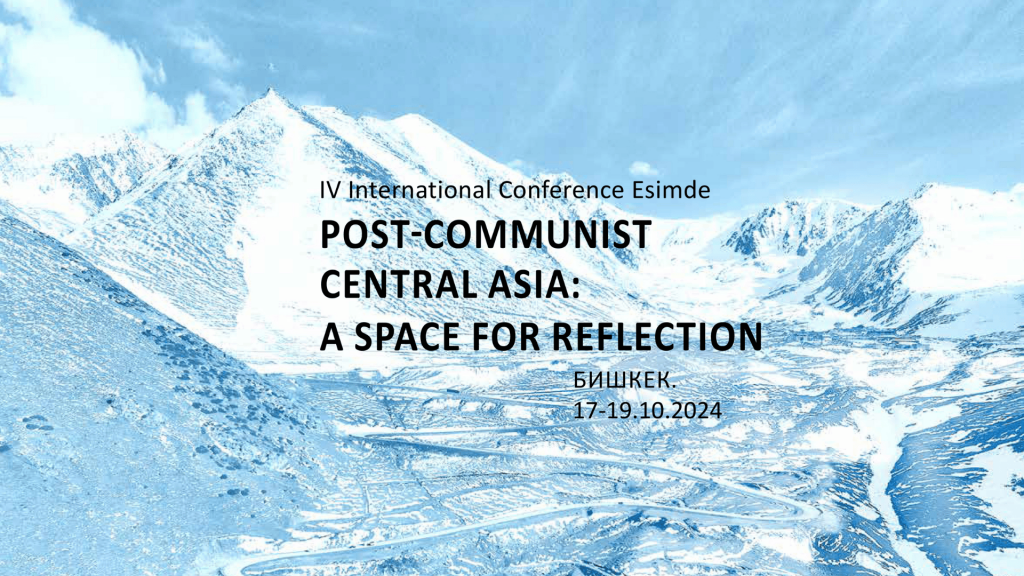
Photo credit: Otabek Nigmatov
Location:
Bishkek, Ololo Planet (Yunusaliev St. 80)
Dates: October 17-19, 2024
DAY I
October 17th
Registration. Opening Tea
8:30 – 9:00
Opening Remarks:
9:00 – 9:30
Elmira Abylbek
head of the Esimde Research and Discussion Platform.
Tynchtykbek Chorotegin
PhD in history, civic activist during the democratic movements in 1990s
Panel I. Central Asia: How Do We Define Our Space?
9:30 – 11:30
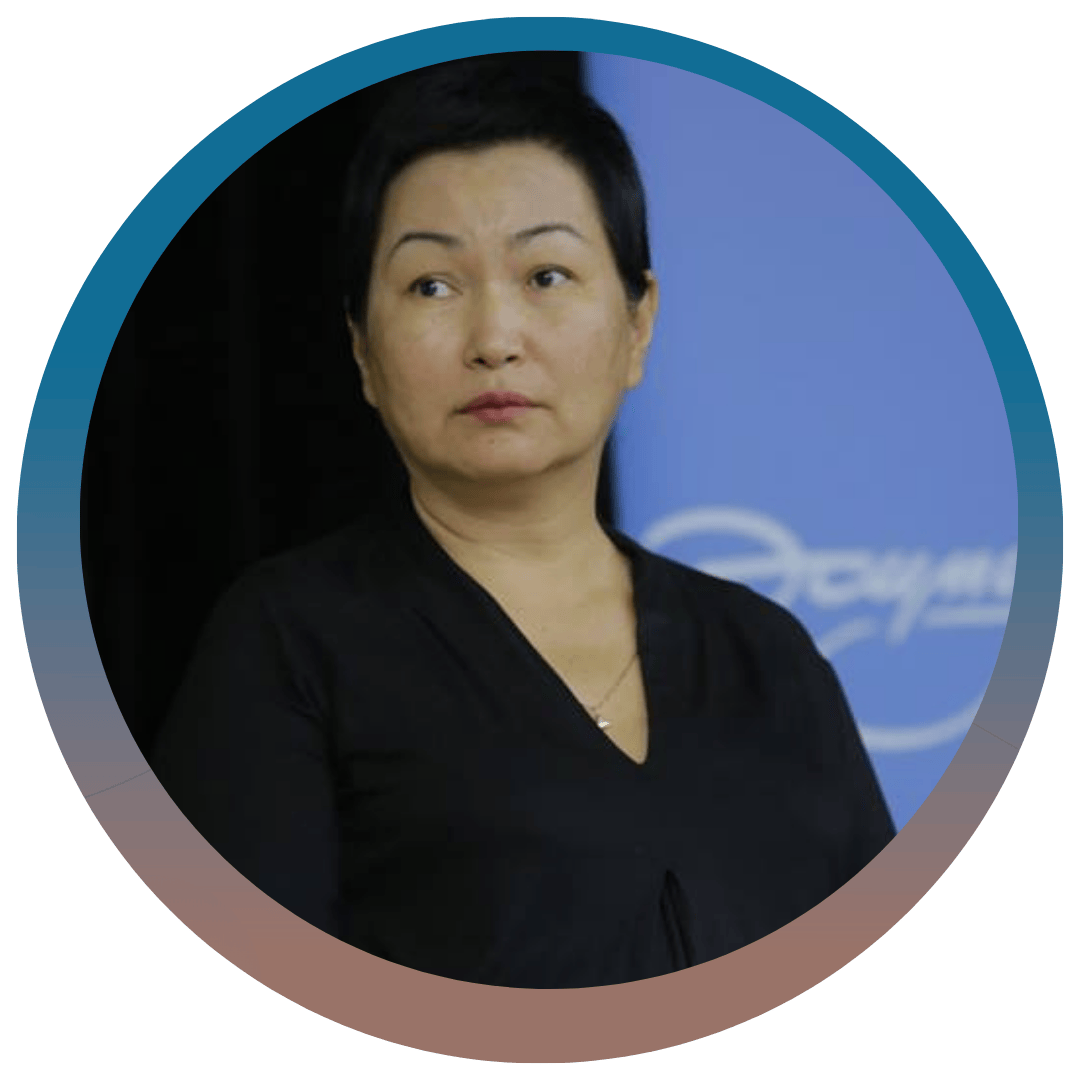
Moderator
Elmira Abylbek
Head of the Esimde Research and Discussion Platform
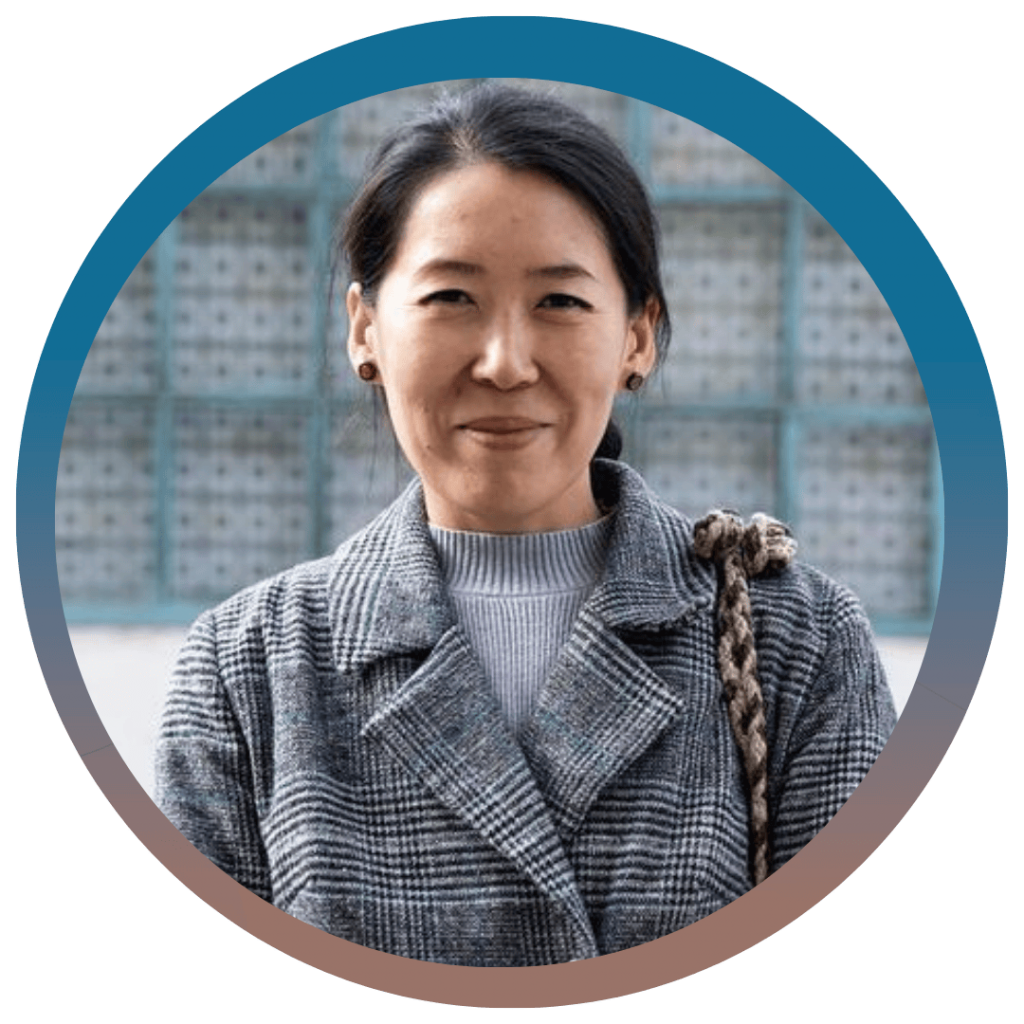
Monumental Art as a Cultural Code: Symbolism and Legacy of Soviet Leaders in the Fergana Valley
Baktygul Midinova (Kyrgyzstan)
Director of the T. Sadykov Osh Regional Museum of Fine Arts, expert in museum management and preservation of historical heritage.
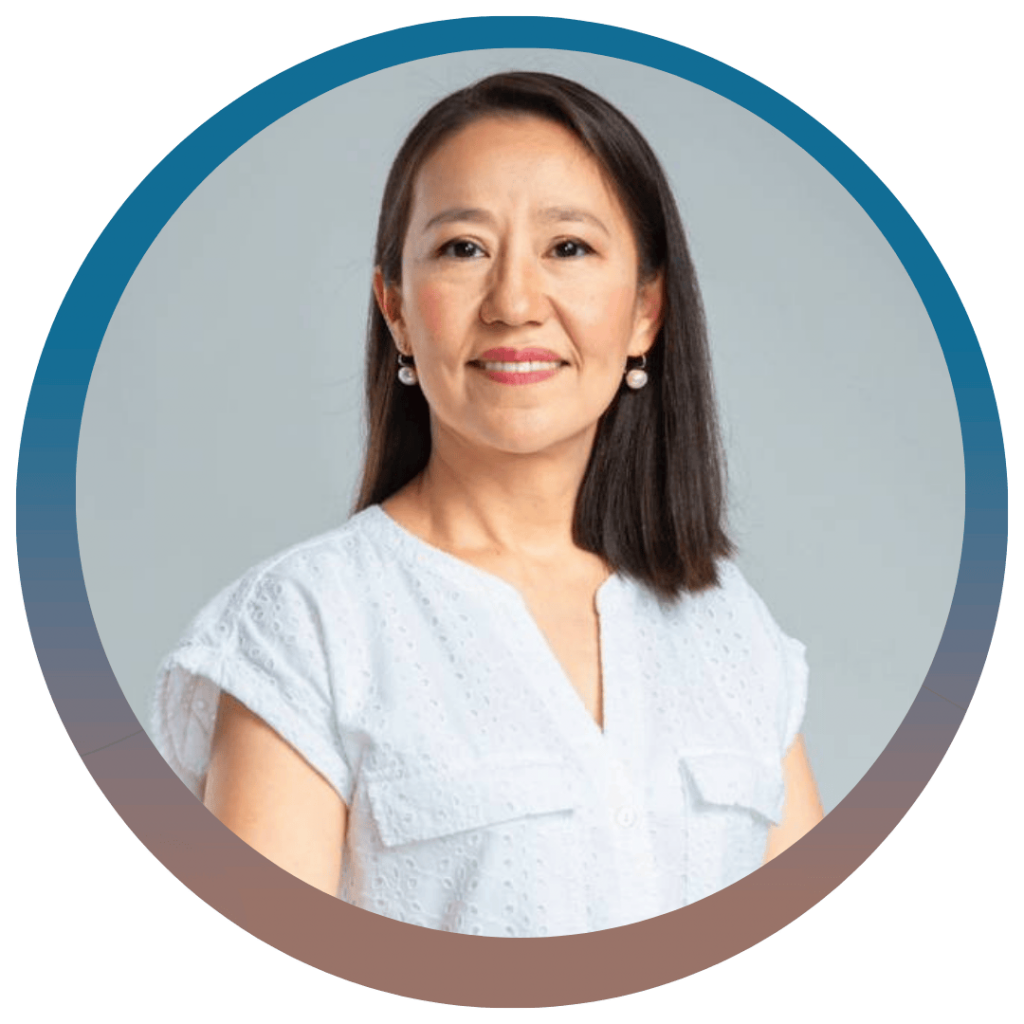
Security Discourse in the Grip of Neo/Colonialism.
Narciss Shukuralieva (Poland)
Doctor of Political Science, Professor of the Faculty of Political Science and Administrative Management, Kazimierz Wielki University.
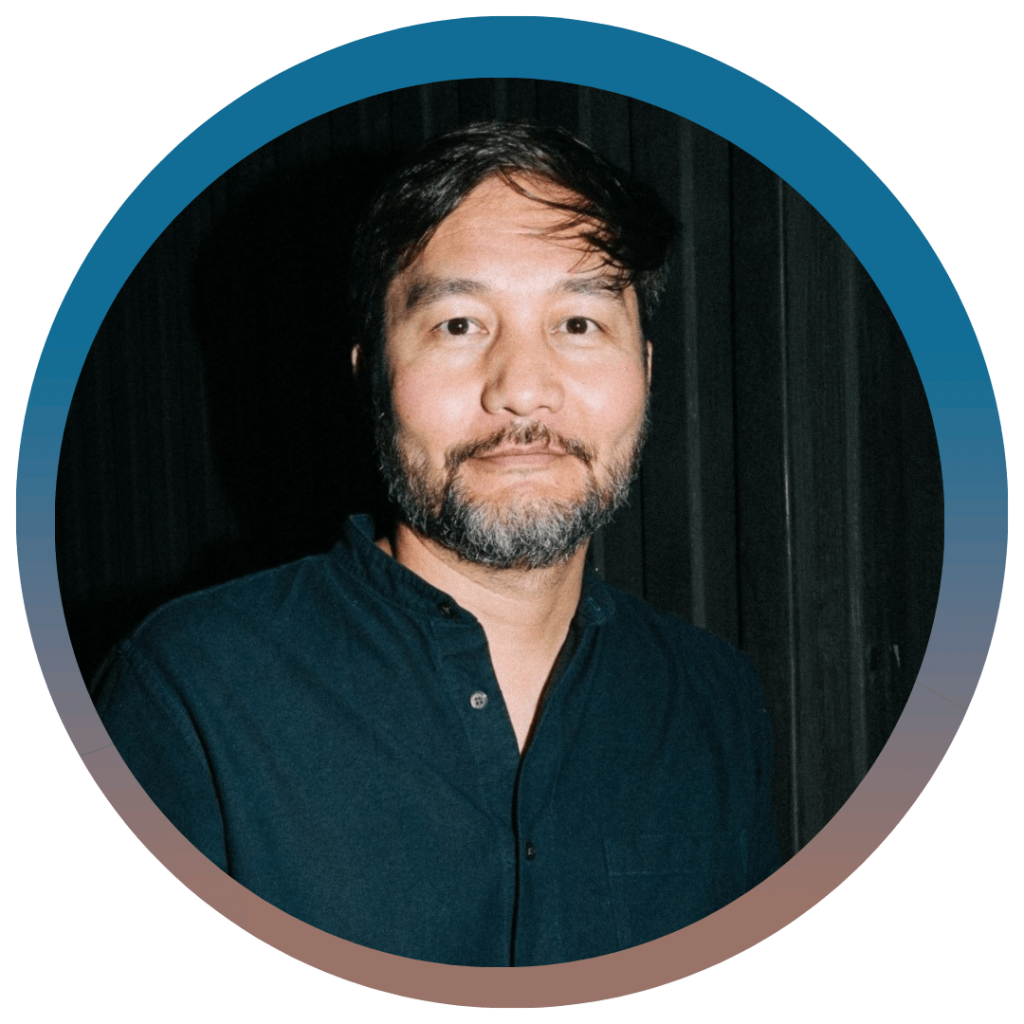
Central Asia: Into the New Century with Old Habits
Zhar Zardykhan (Kazakhstan)
historian and political scientist, researcher of Central Eurasian and Middle Eastern history
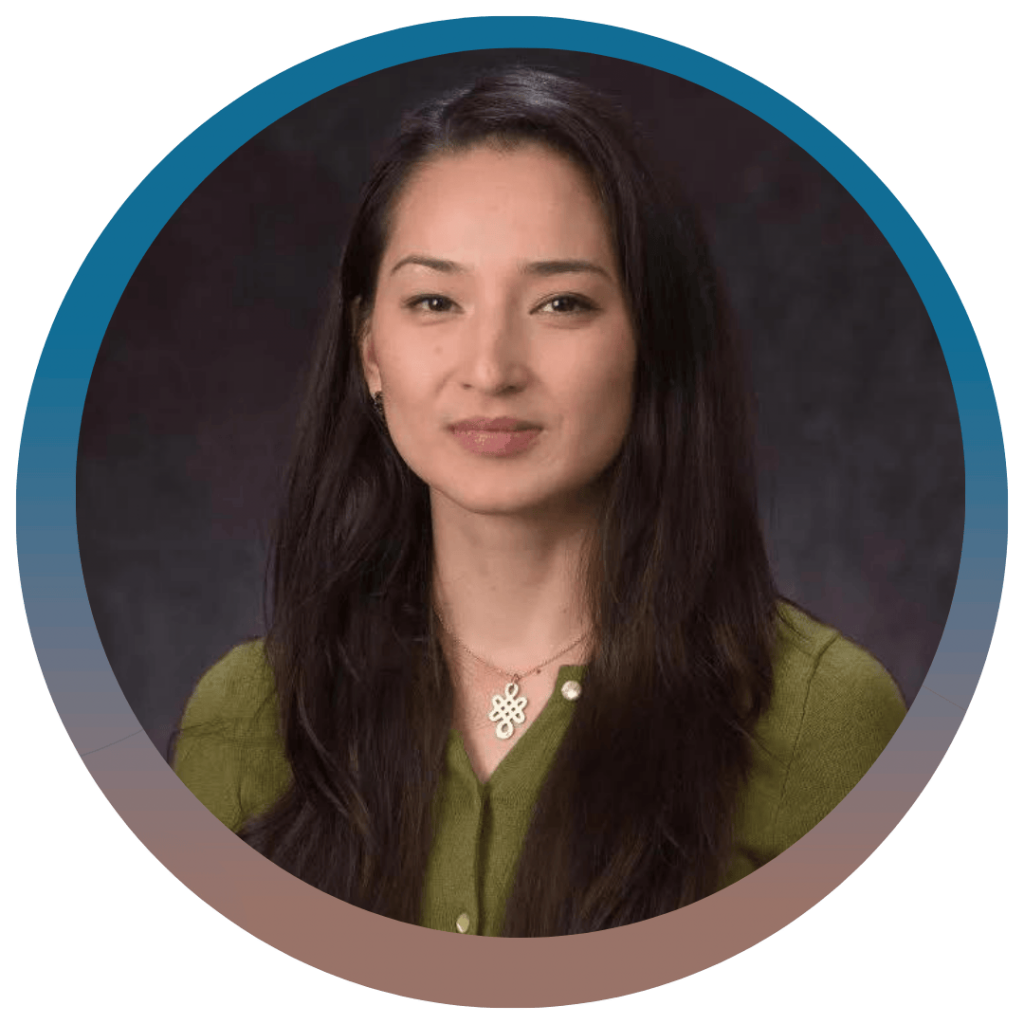
Power without influence: decolonial movements of the North and Central Asia
Erica Marat (Kyrgyzstan)
Associate Professor and Chair of the Department of Regional and Analytical Studies, National Defense University.
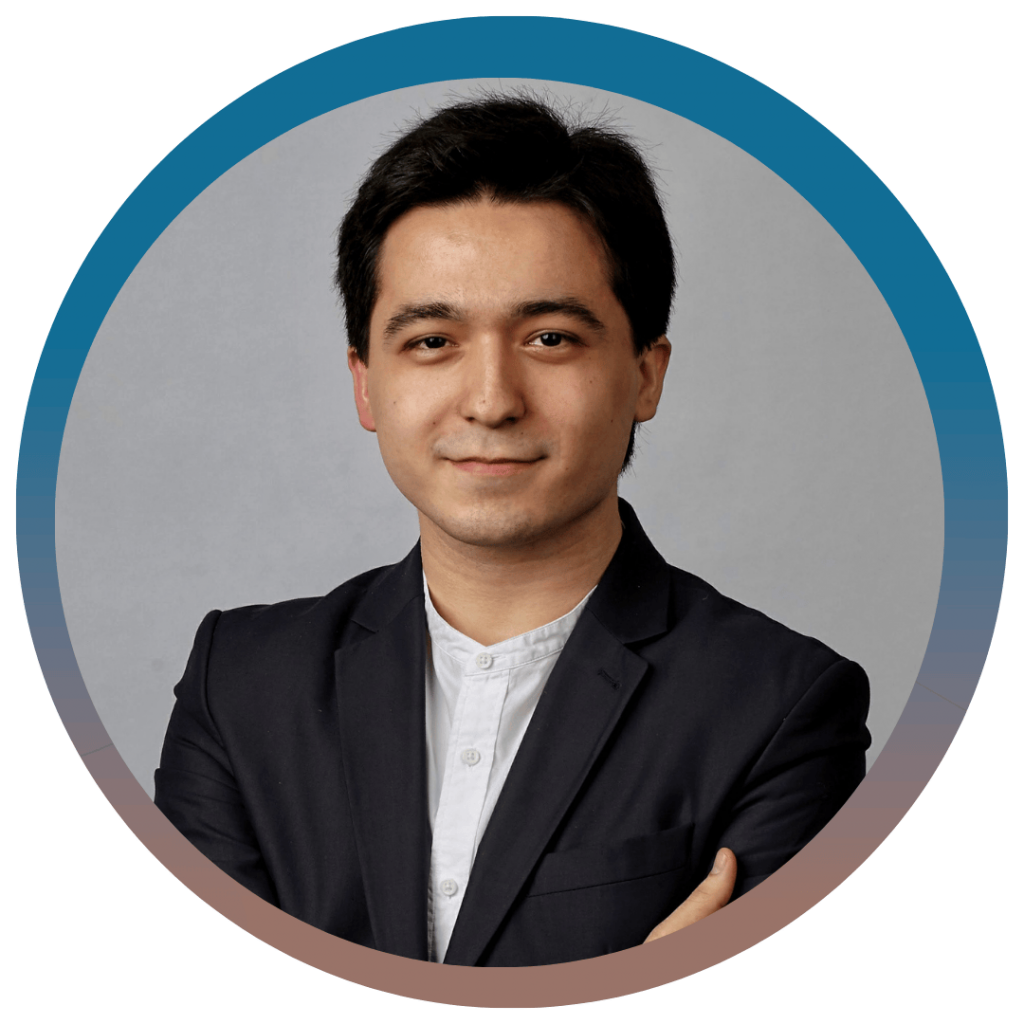
No one’s courtyard: steady Central Asia
Temur Umarov (Uzbekistan)
Research Fellow at the Carnegie Russia Eurasia Center, Berlin
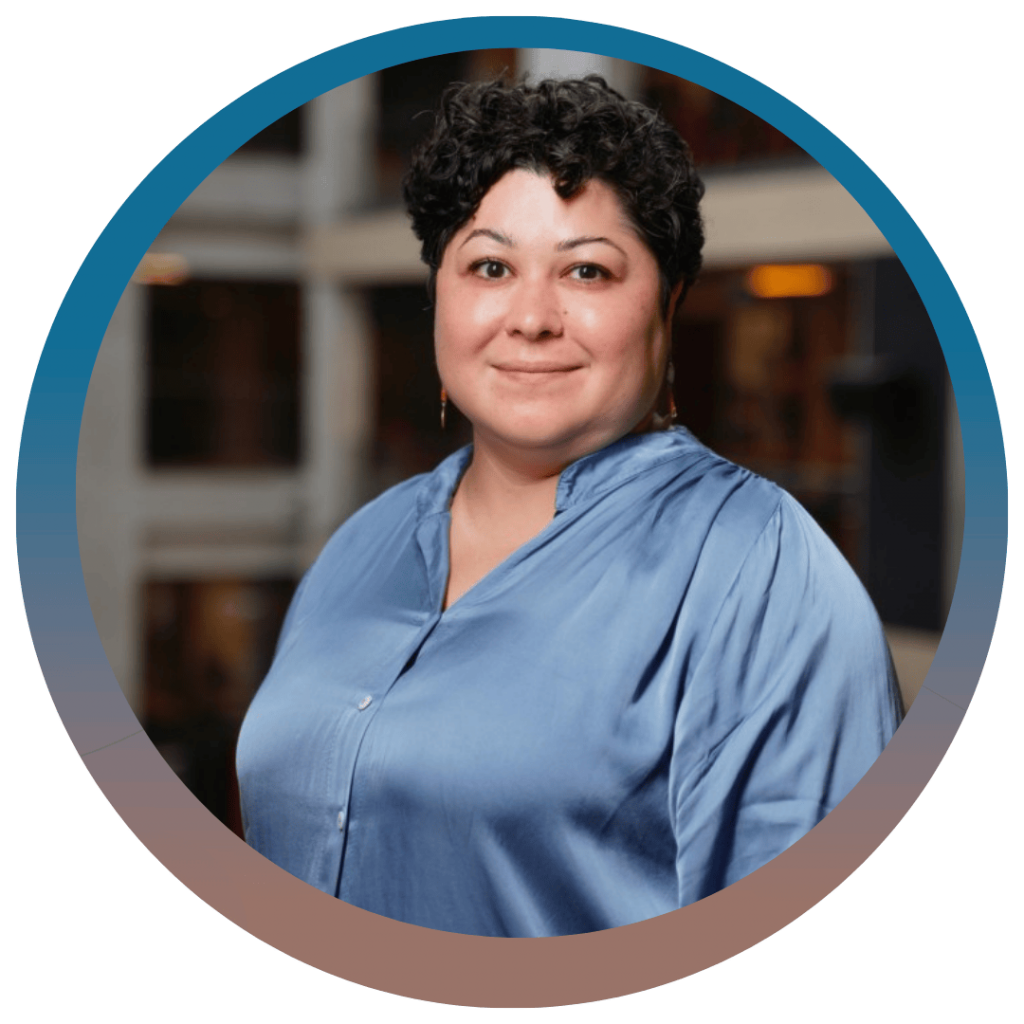
Postsocialism as a method and critics
Mohira Suyarkulova (Kyrgyzstan)
“Psychology” faculty dean at the American University in Central Asia, PhD in International Relations
Panel II. Central Asia: Defending Our Freedom (1985-1991)
11:30 – 13:00
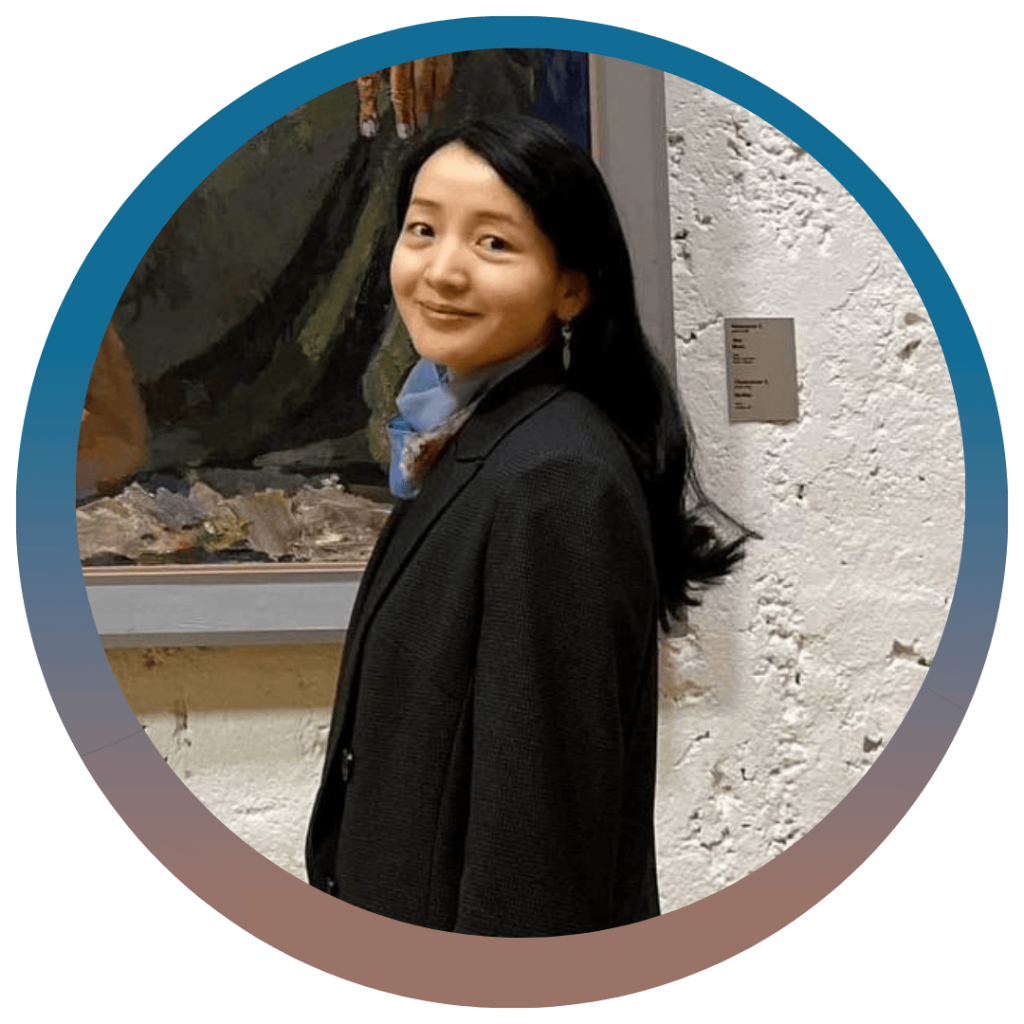
Moderator
Gulzat Alagoz (Kyrgyzstan)
Researcher at the Esimde Research and Discussion Platform
Esimde Research Presentation:
“Democratic Movements in Kyrgyzstan (1985-1991)”
(100 interviews database and analytical report)
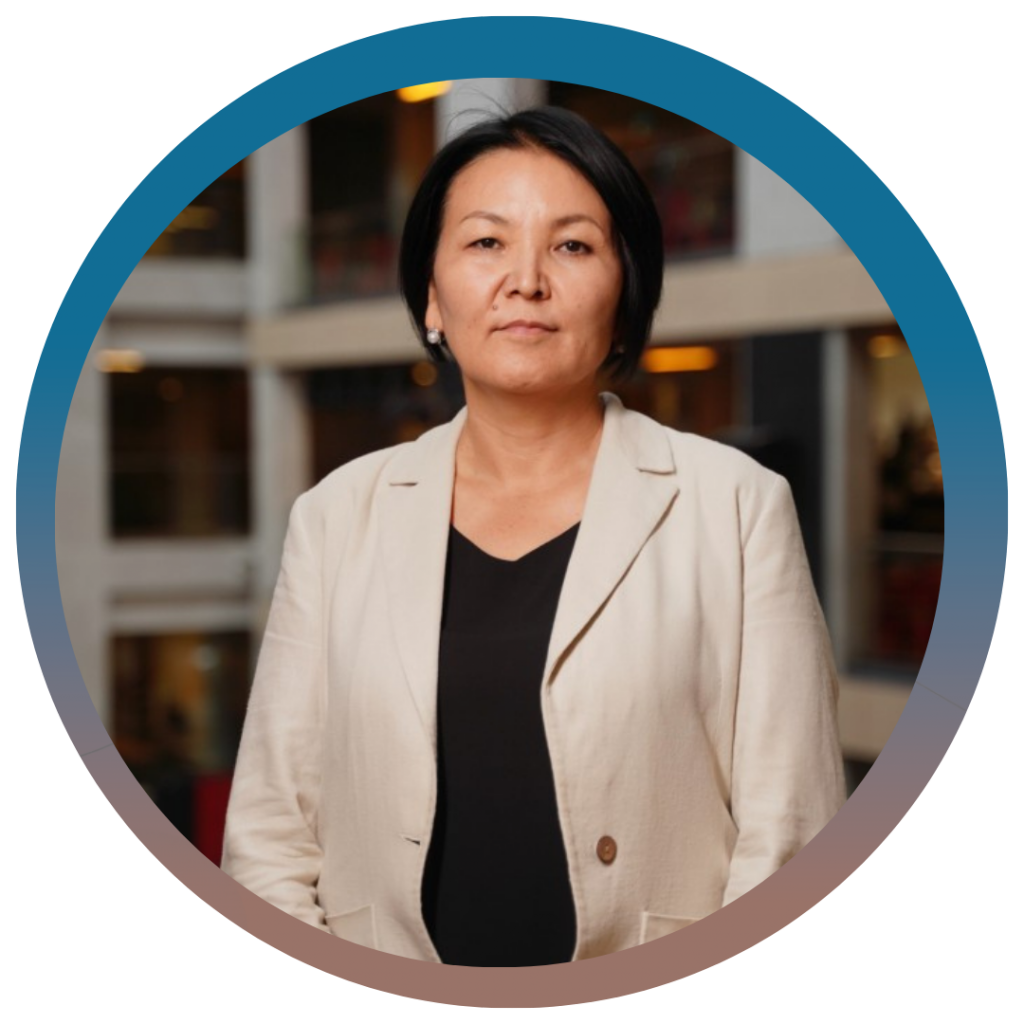
Mukaram Toktogulova (Kyrgyzstan)
Associate Professor of Anthropology, American University of Central Asia, PhD in Philology
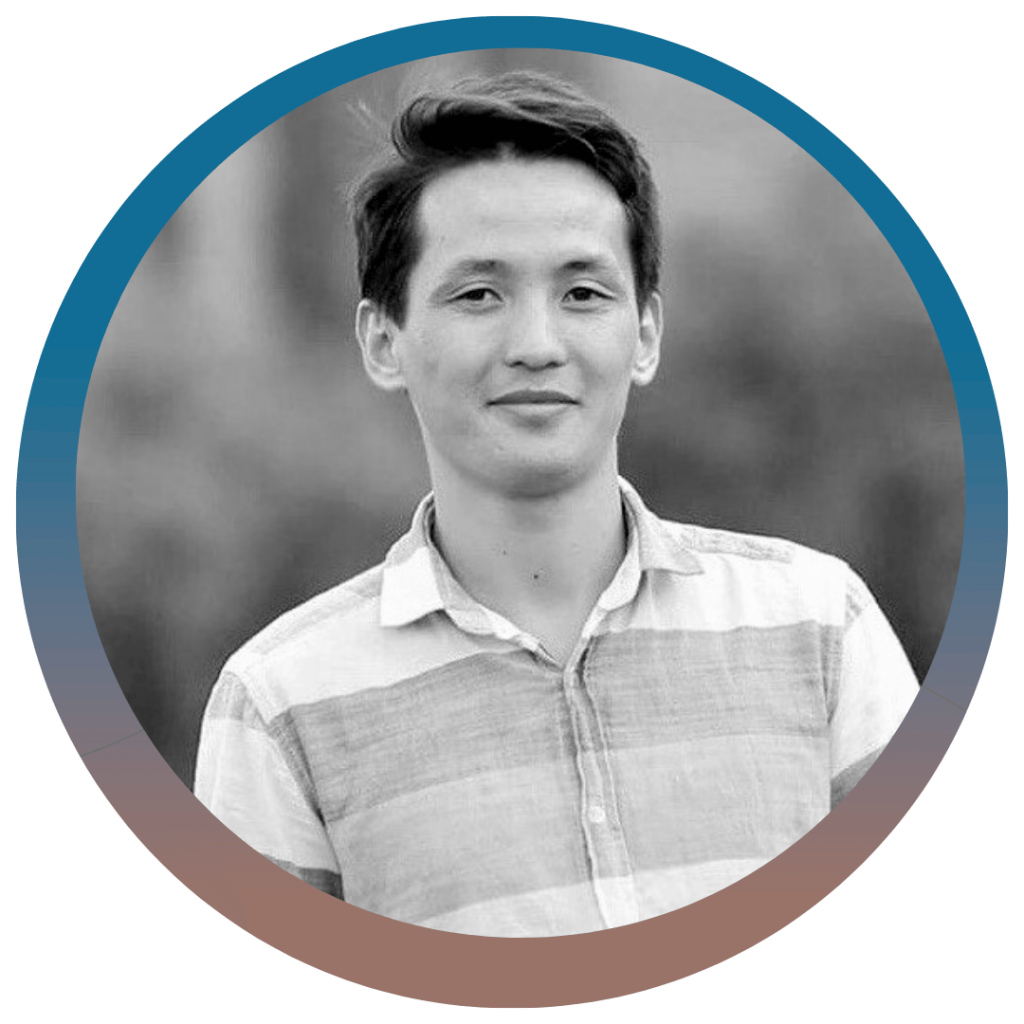
Azamat Alagoz (Kyrgyzstan)
Historian, Research Fellow at the National Academy of Sciences
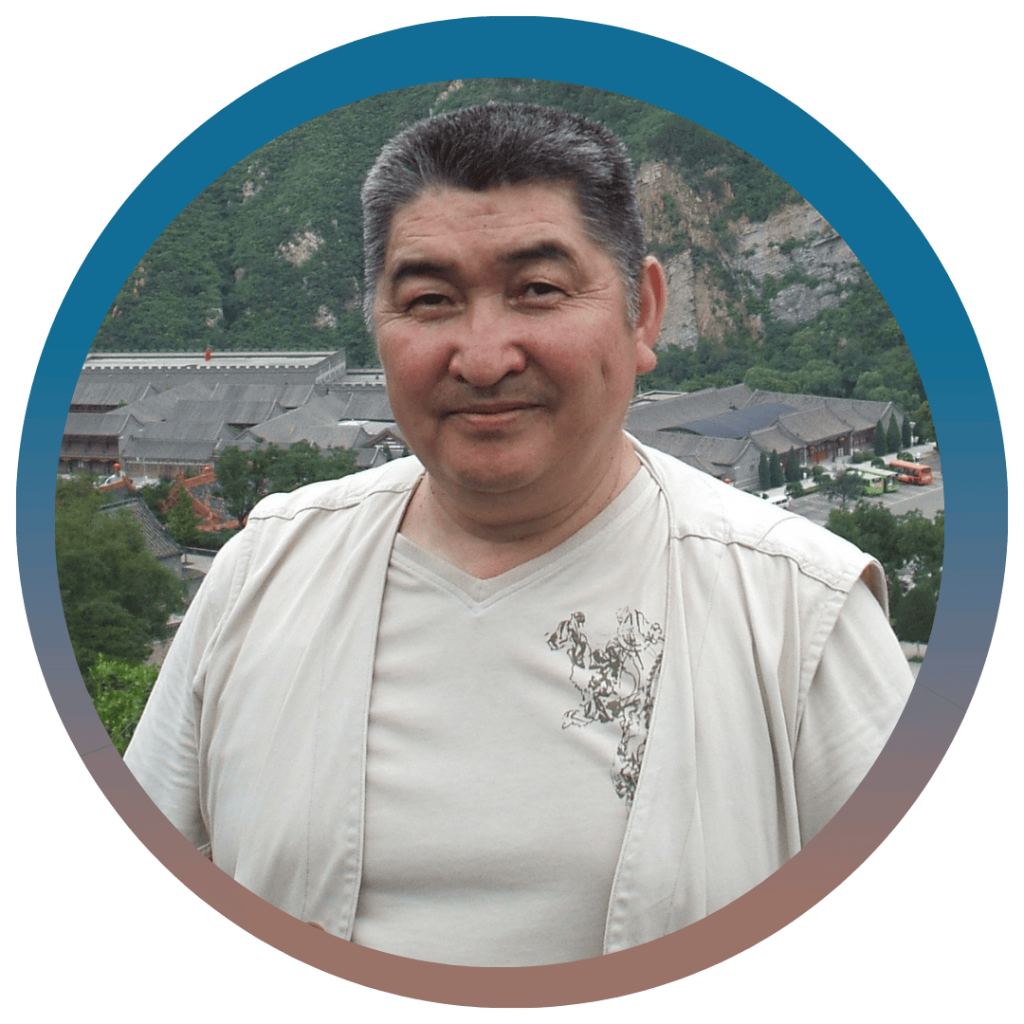
Tynchtykbek Chorotegin (Kyrgyzstan)
PhD in History, Kyrgyz National University professor, civic activist during the democratic movements in 1990s in KR
***

Archiving Ashar: Toward a Digital ‘Memory Bank’ of Perestroika Activism in Kyrgyzstan.
Madeleine Reeves (The United Kingdom)
Professor of Anthropology, Oxford University.

Activism in Memory and Grassroots Commemoration: The December 1986 Protests (Zheltoksan) in Kazakhstan
Kamila Smagulova (Kazakhstan)
PhD researcher, Leiden University, EUCAM fellow
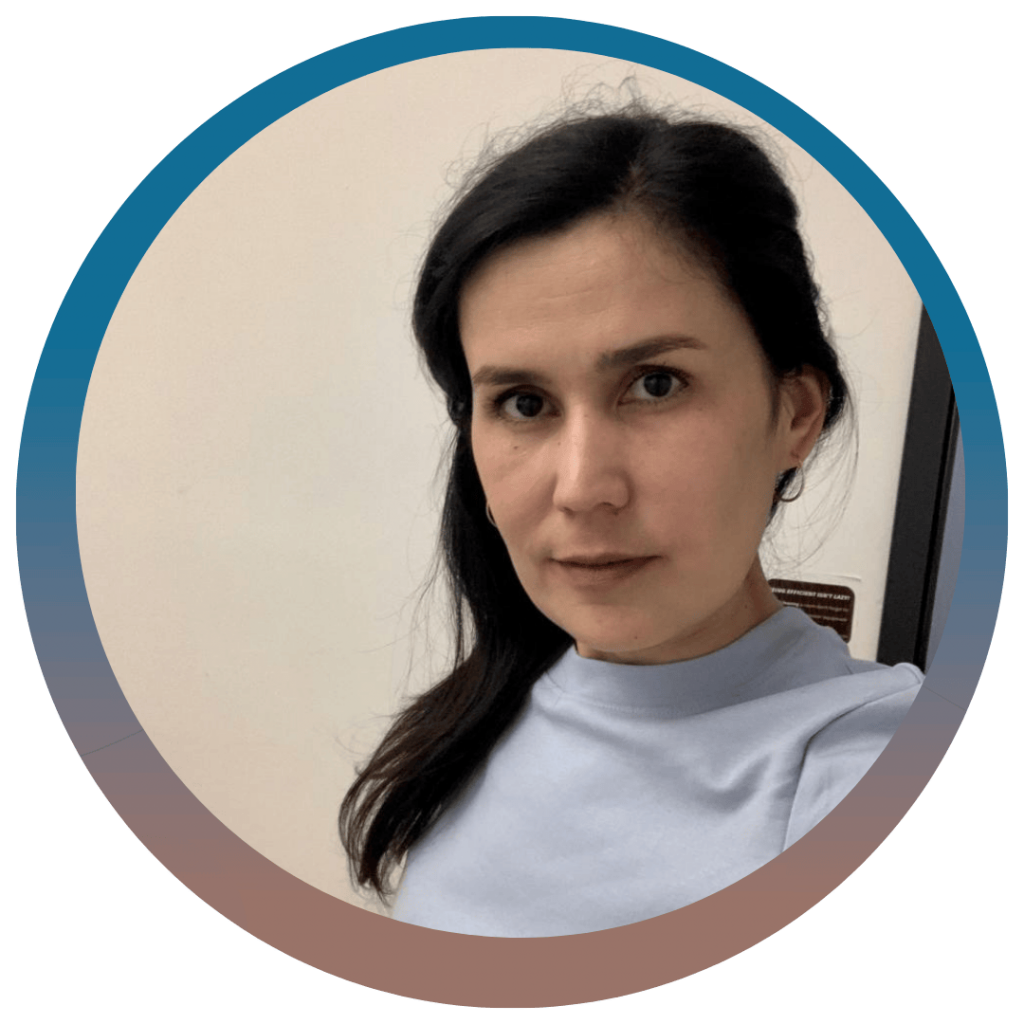
Reconstruction in Central Asia: Transformations of Women’s and National Images in the Soviet Kyrgyz and Uzbek Press (1985–1991).
Gulrano Ataeva (Uzbekistan)
doctoral candidate at the history faculty, CEU University
Exhibition Opening:
CARAVAN: Roads of Memory
(Exhibition Hall, Ololo Planet, 1st Floor)
Tea & Snacks
13:00 – 14:00
Panel III. Memory in Central Asia: Between Activism and Research
14:00 – 15:30
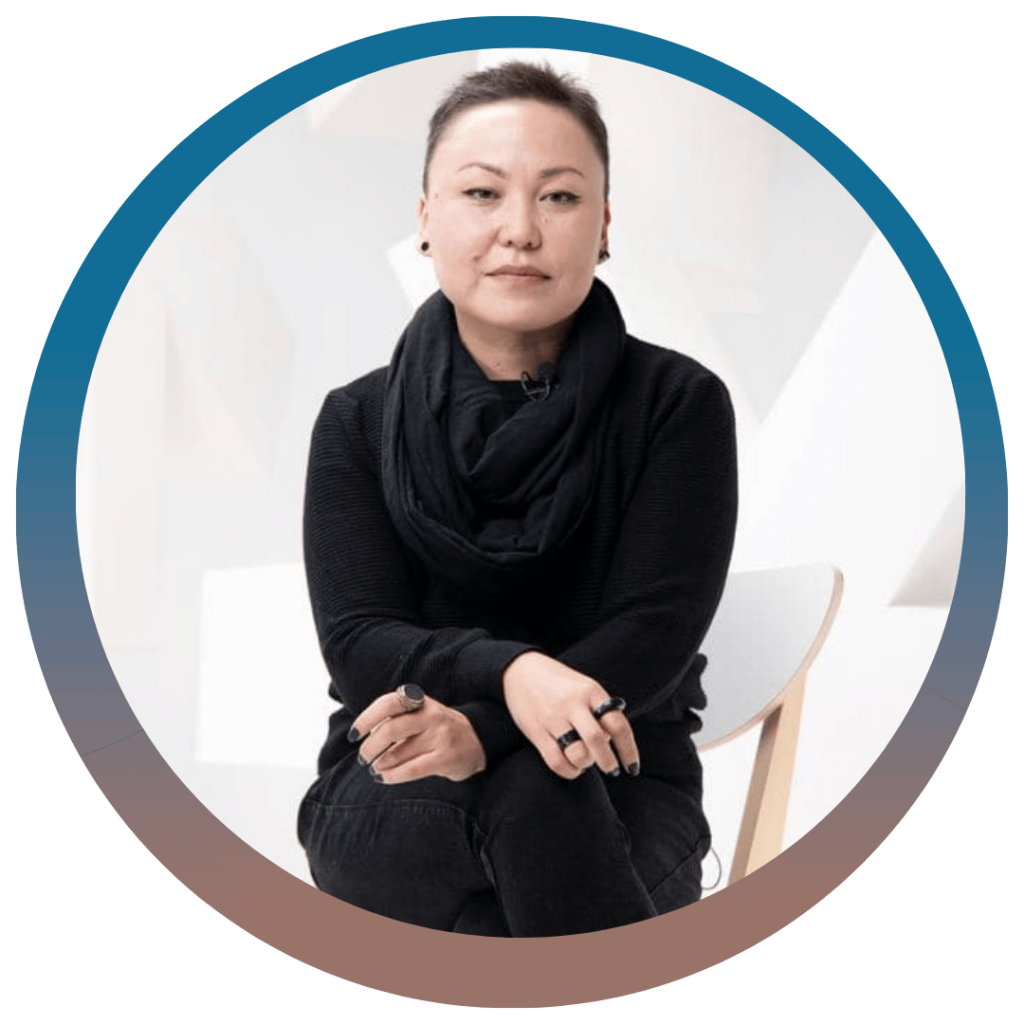
Moderator
Altyn Kapalova (Kyrgyzstan)
activist, artist and children’s writer from Kyrgyzstan
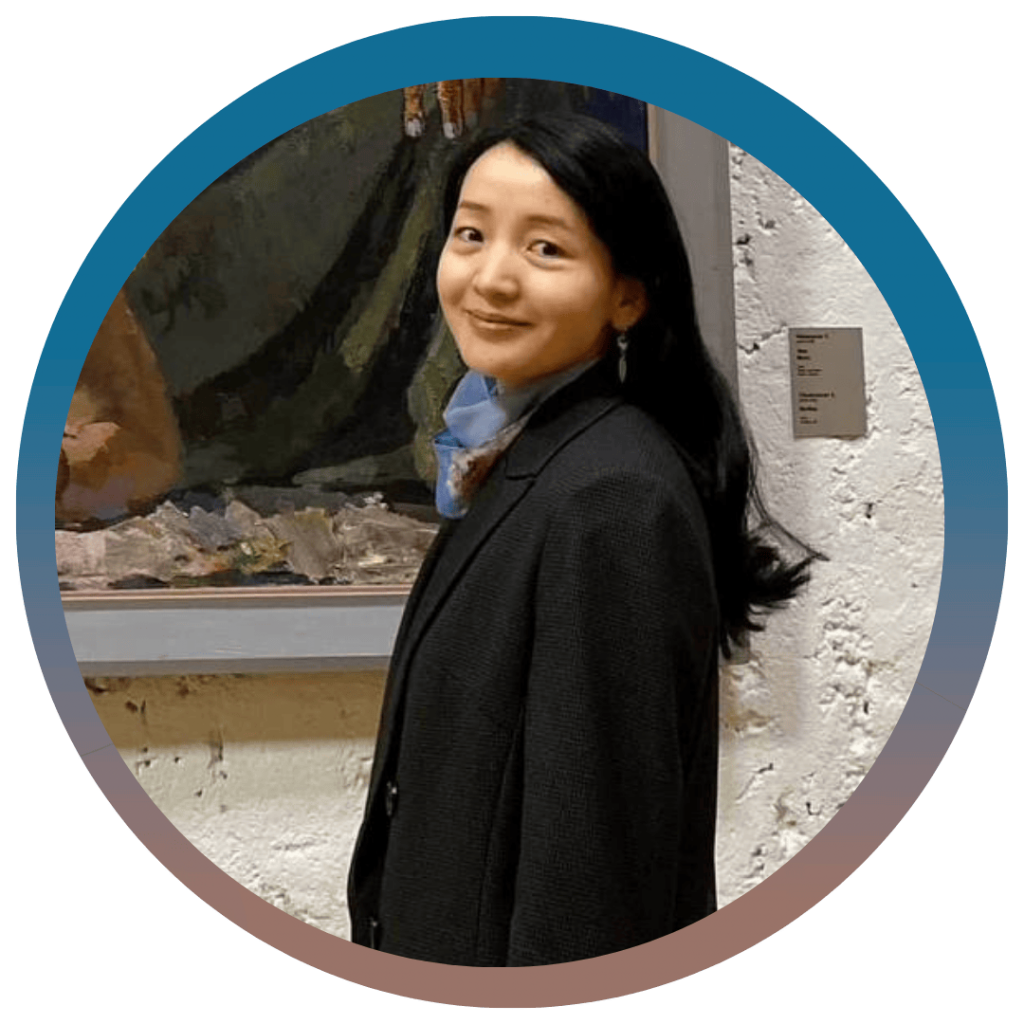
Urkun Memorial Tour, Online Platform 1916
Gulzat Alagoz (Kyrgyzstan)
Esimde Research and Discussion Platform researcher

Mountains of Sorrow: The Role of Art in Shaping Historical and Contemporary Narratives of the 1916 Uprising
Altyn Kapalova (Kyrgyzstan)
activist, artist and children’s writer from Kyrgyzstan
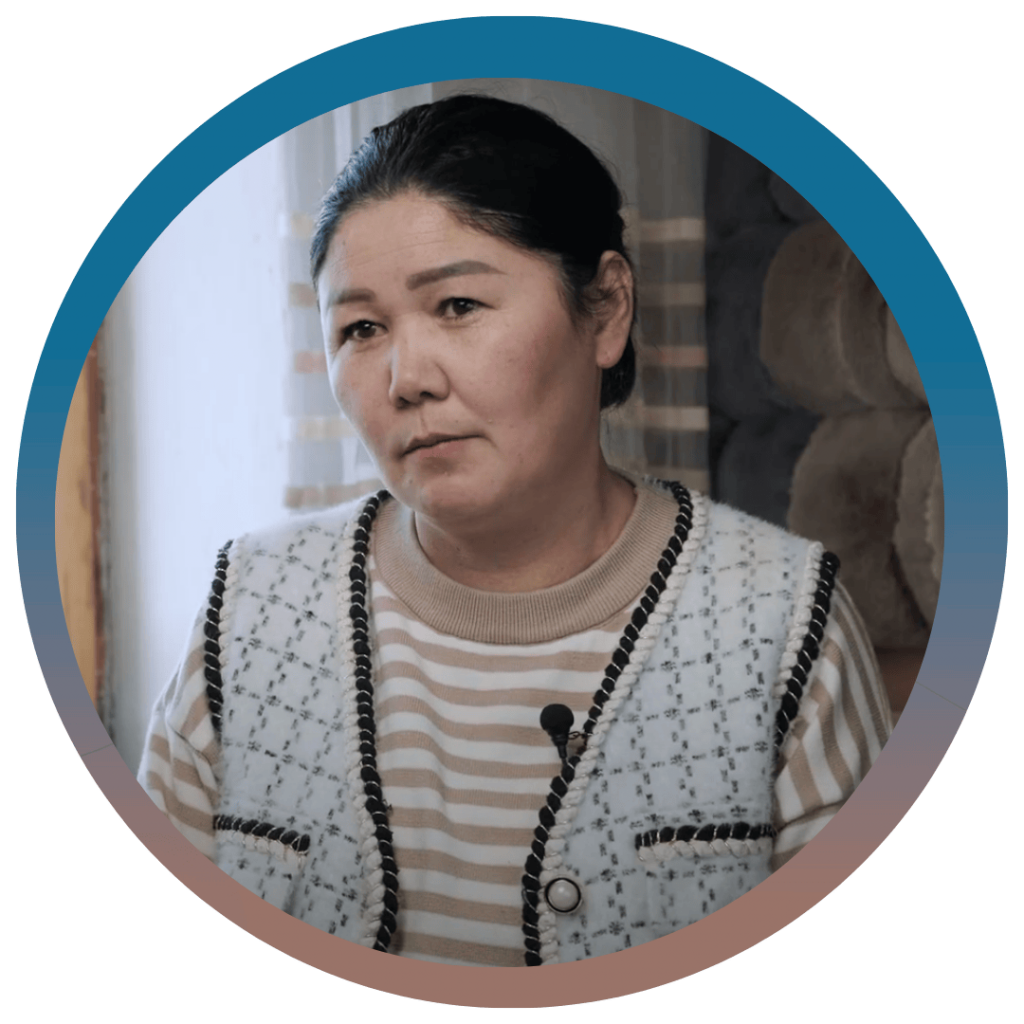
Film: “Memories in Captivity”
Baktygul Akunbaeva (Kyrgyzstan)
researcher, studying the 2 world war Kyrgyz prisoners topic

About the “DOPE SOZ” podcast
Arsen Tussupbekov (Kazakhstan)
co-author of the podcast “DOPE SOZ”, activist
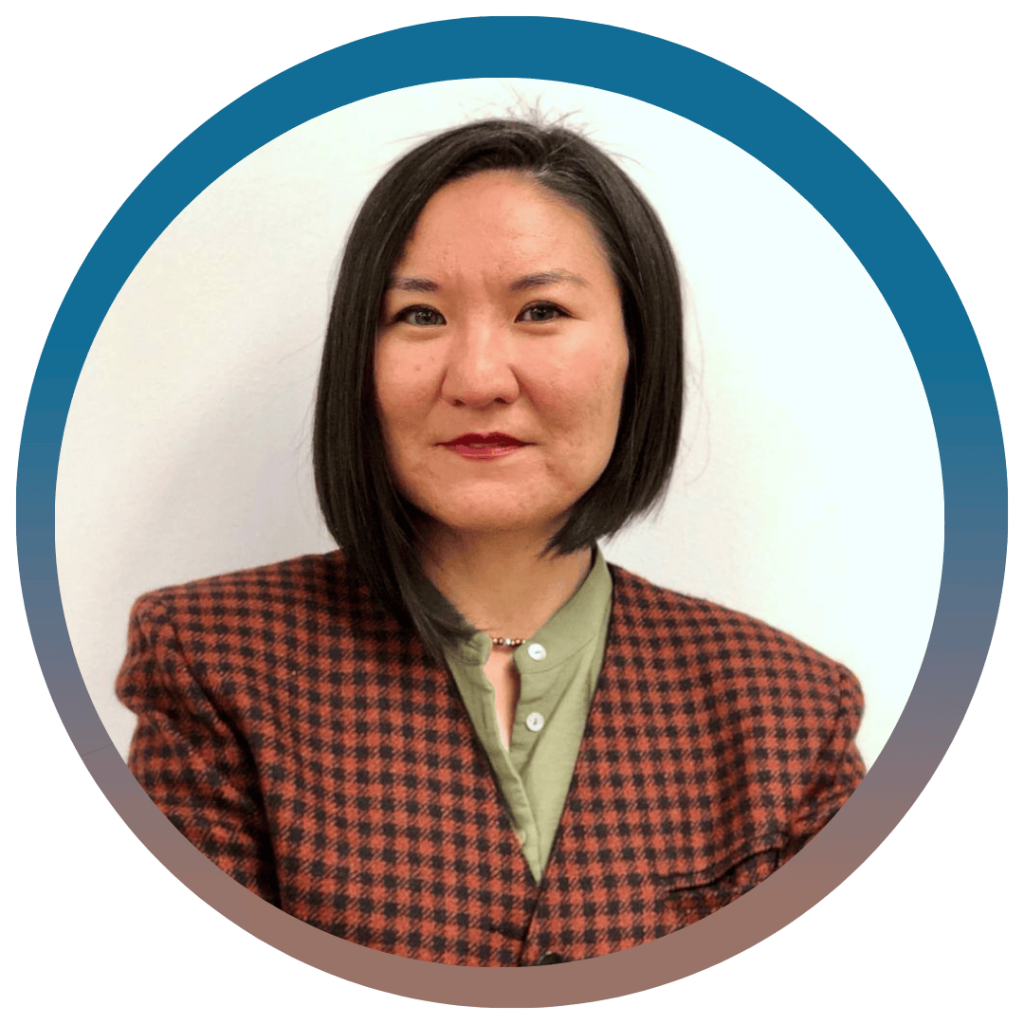
“Family Ethnography, or How to Decolonize Your Writing”
Elmira Kakabayeva (Kazakhstan)
writer and creator of a creative writing course
Panels IV: The Right to Memory
Part I. The Right to Memory: Women’s Fates
15:30 – 17:00
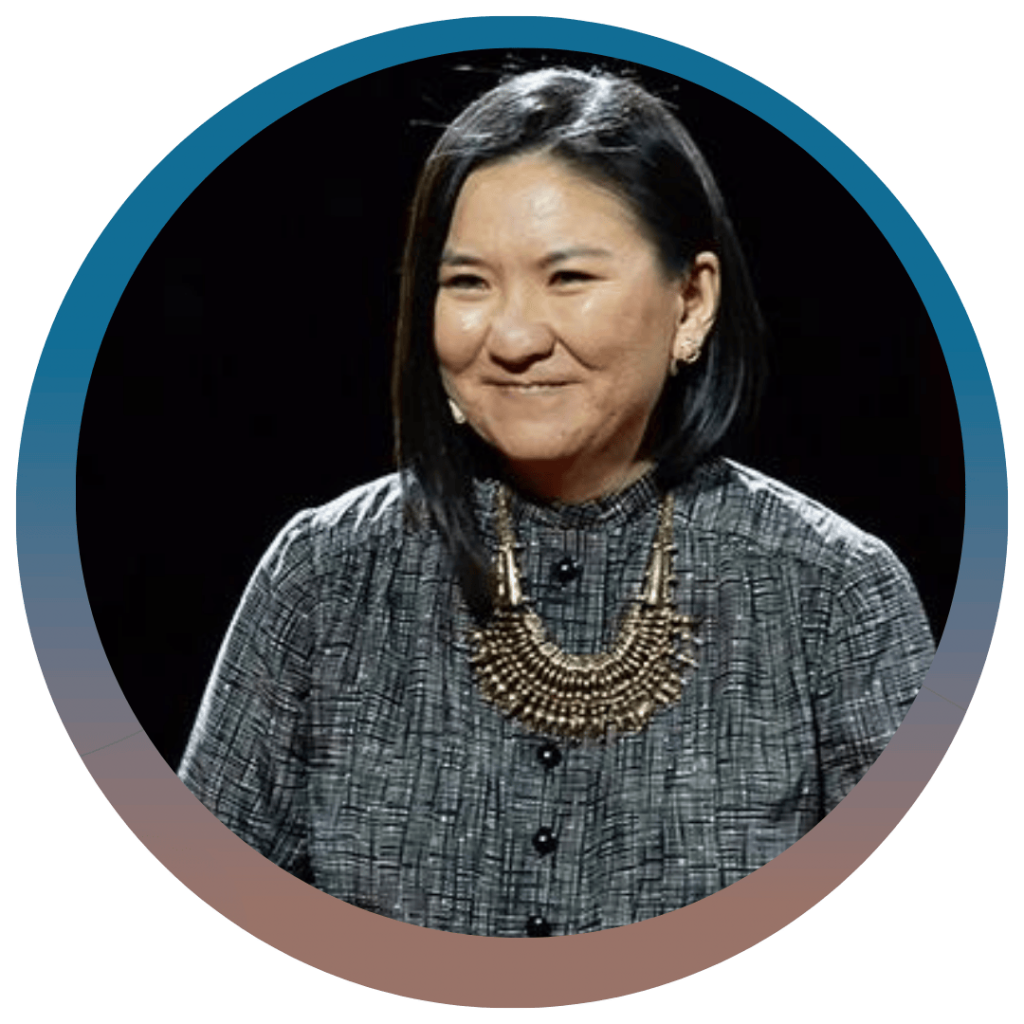
Moderator
Elmira Kakabayeva
writer and creator of a creative writing course

Presentation of the Esimde book “Women’s Fates”
Gulzat Alagoz (Kyrgyzstan)
Esimde Research and Discussion Platform researcher
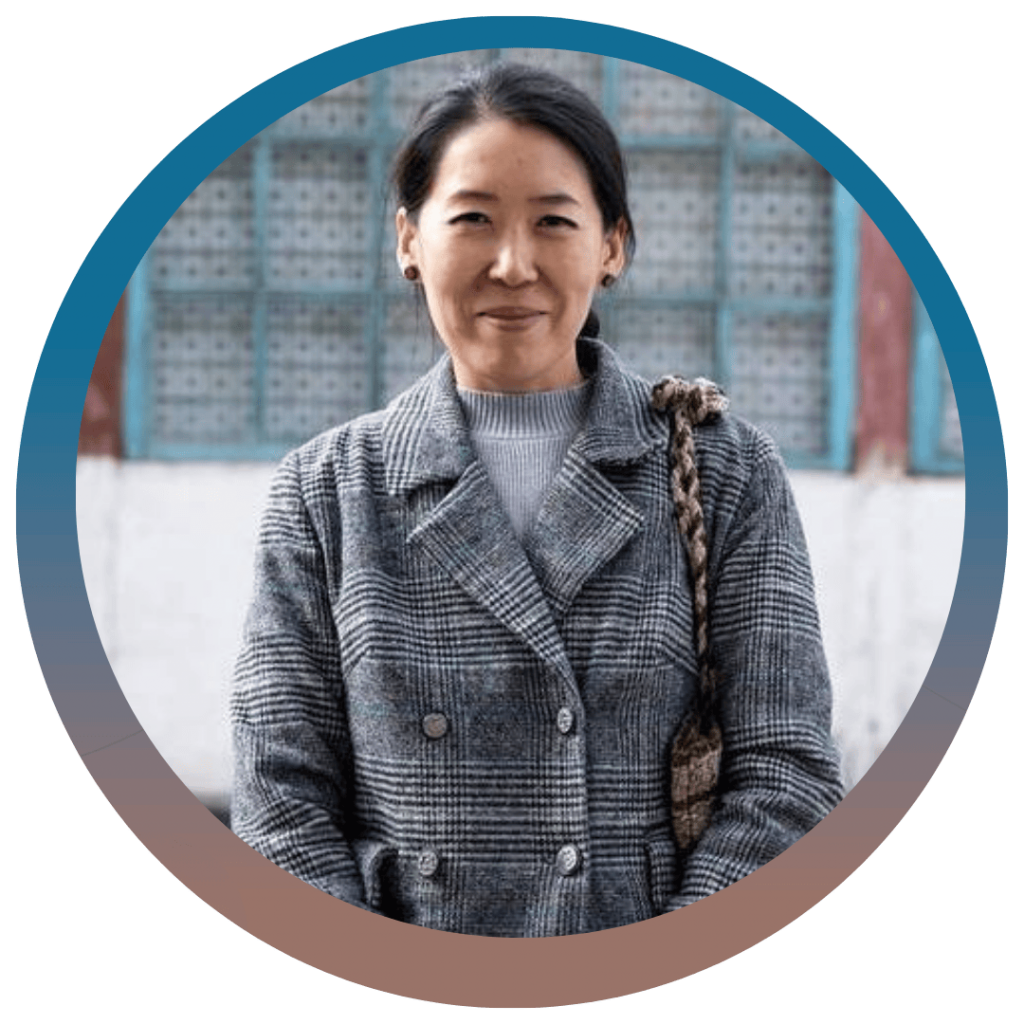
Women and Cotton: The Gender Dimension of Labor in the Soviet Union
Baktygul Midinova (Kyrgyzstan)
director of the Osh Regional Museum of Fine Arts named after T. Sadykov. Specialist in museum management and preservation of historical heritage.
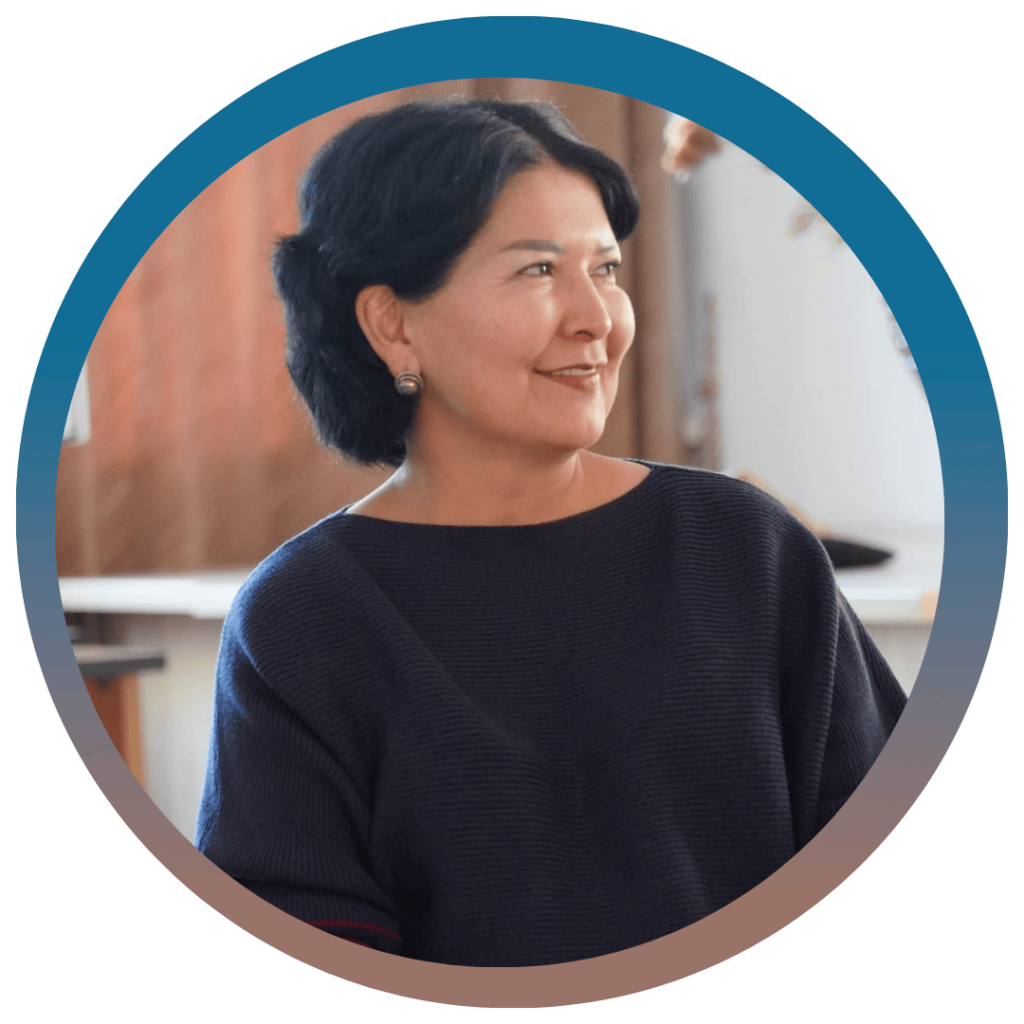
Repressed Women: History of GULAG in Kyrgyzstan
Saltanat Asekova (Kyrgyzstan)
historian, candidate of historical sciences, researcher of the Ata-Beyit Memorial Complex
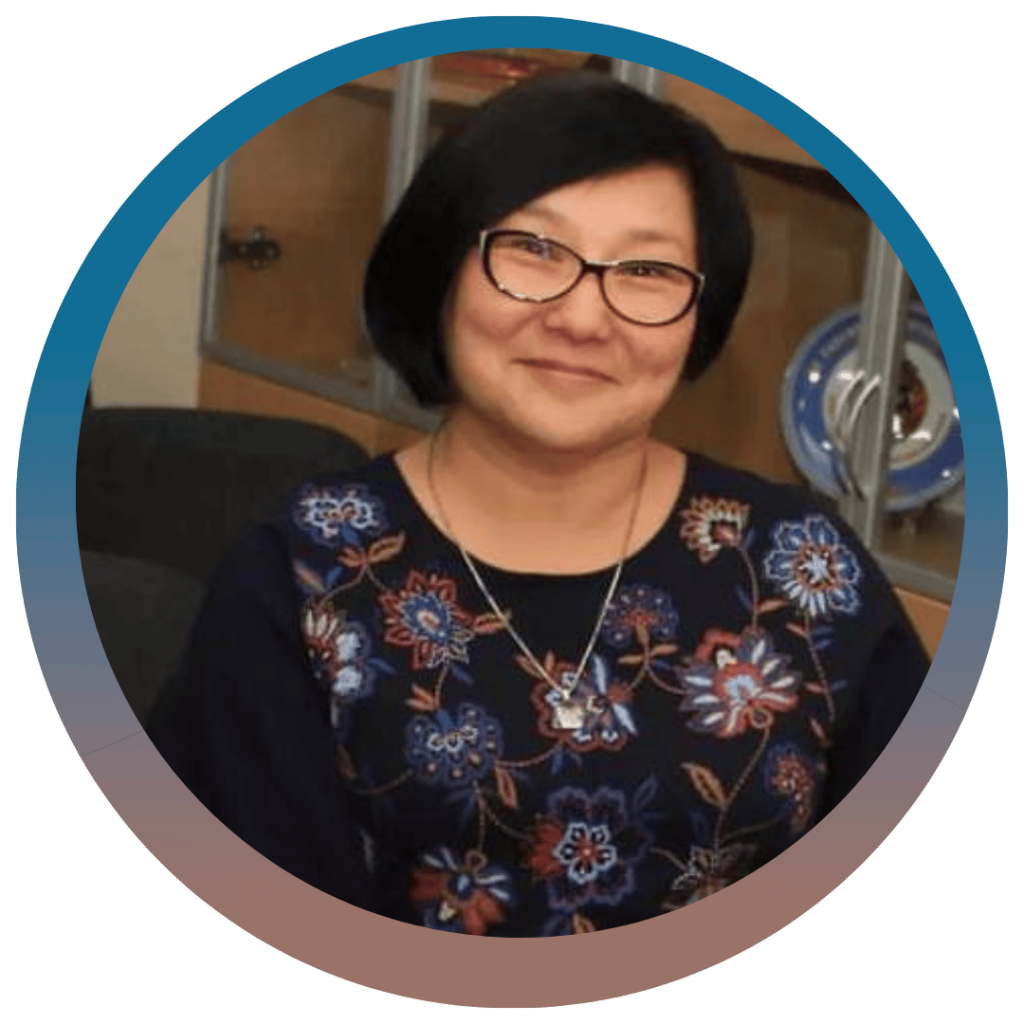
Forward to the Totalitarian Past?’, or Regina Khelimskaya’s Testament
Aigul Omurkanova (Kyrgyzstan)
researcher, candidate of philological sciences
#workshop. “Family Ethnography or How to Decolonize Your Writing” by Elmira Kakabayeva, writer and creator of the creative writing course
17:00 – 18:00
DAY II
October 18th
Registration
8:30 – 9:00
IV ПАНЕЛЬ.
Panel IV: The Right to Memory
9:00 – 10:30
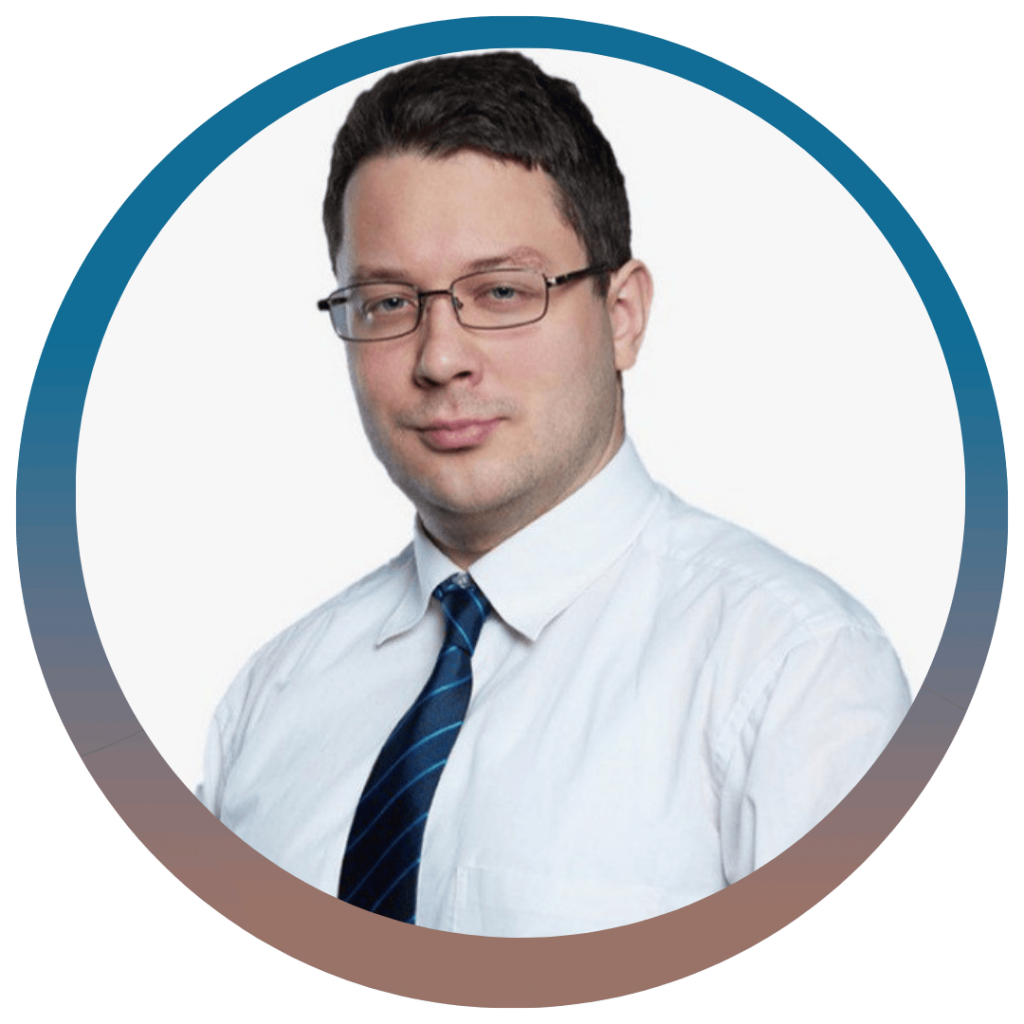
Moderator
Artem Orlov
political scientist, “People in History: post soviet experience” Memorial project’s curator
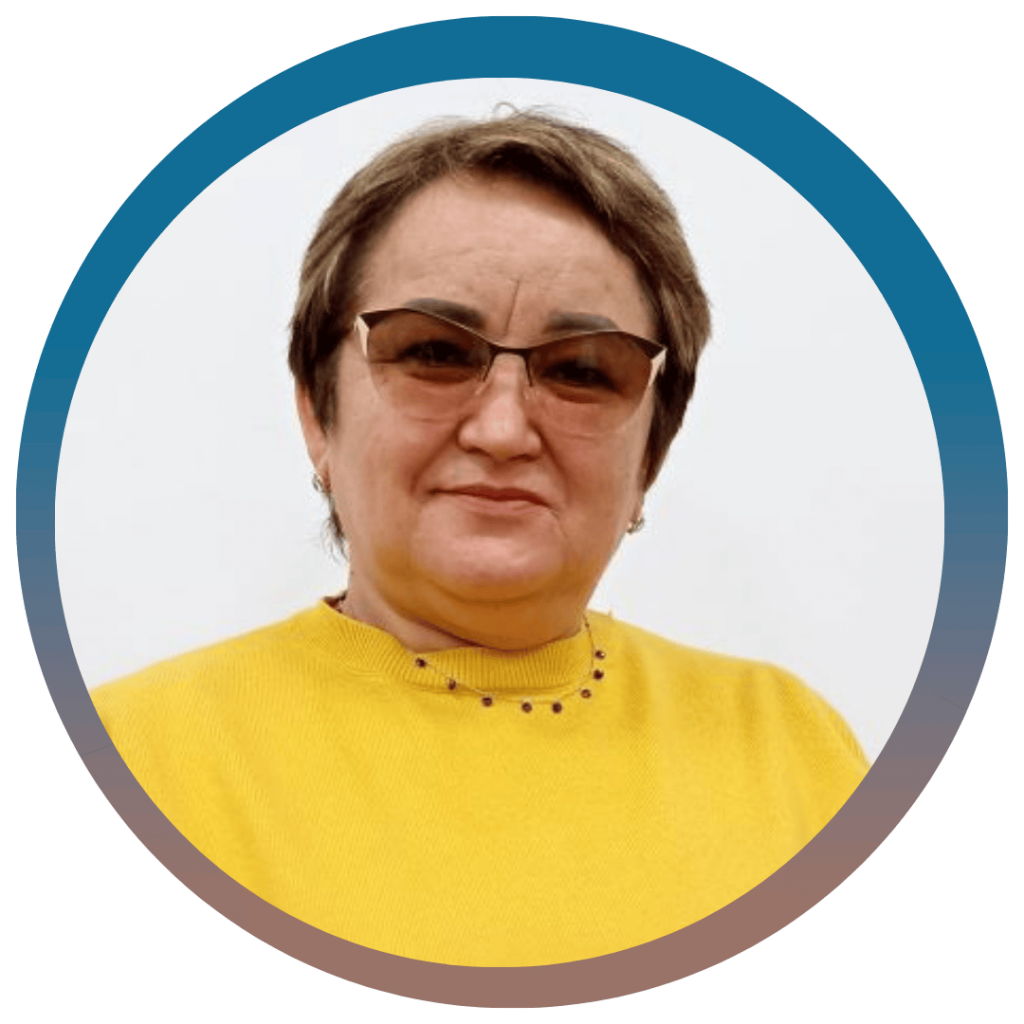
Political Repression in Kyrgyzstan. Fates of Tatars
Anisa Bikbulatova (Kyrgyzstan)
doctor of Historical Sciences, Professor of the Department of Archaeology, Ethnology, Source Studies and Historiography, J. Balasagyn Kyrgyz National University
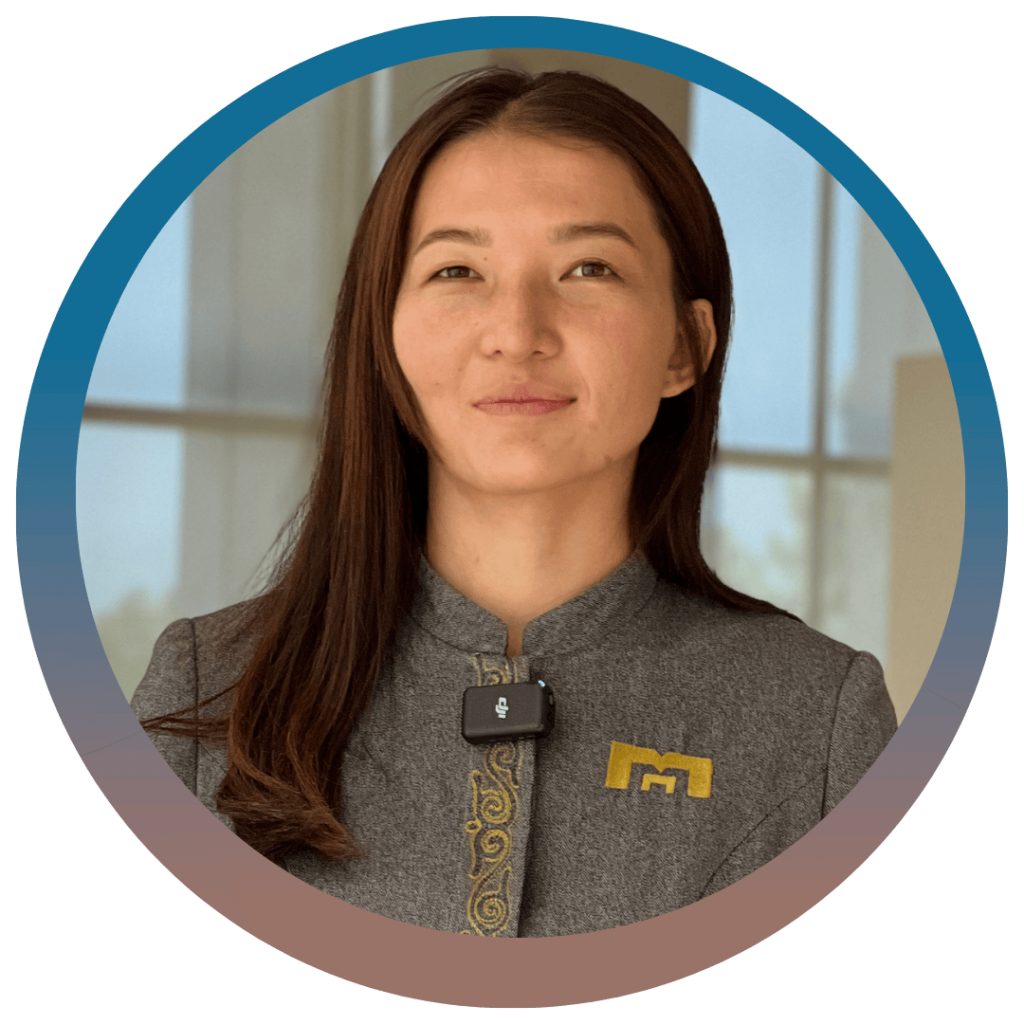
Deportation of the Balkars to Kyrgyzstan
Alina Nuradilova (Kyrgyzstan)
historian, research fellow at the Kyrgyz National Historical Museum

The Great Repression through Microhistory: Stalinist Deportations from Poland and Ukraine to Central Asia
Nestor Pilawski (Kyrgyzstan)
researcher, PhD fellow
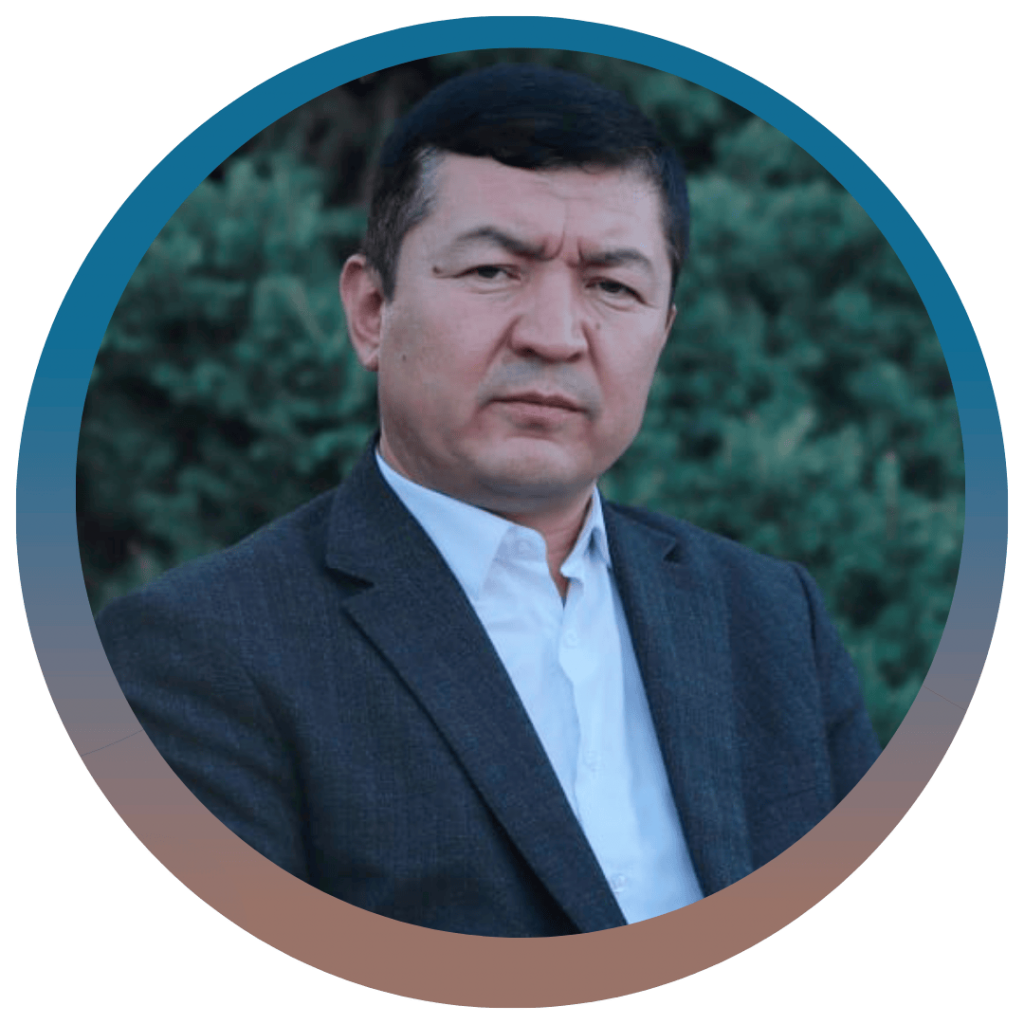
Jadidism in Uzbekistan
Bahrom Irzayev (Uzbekistan)
research fellow at the Museum of Victims of Political Repression in Tashkent
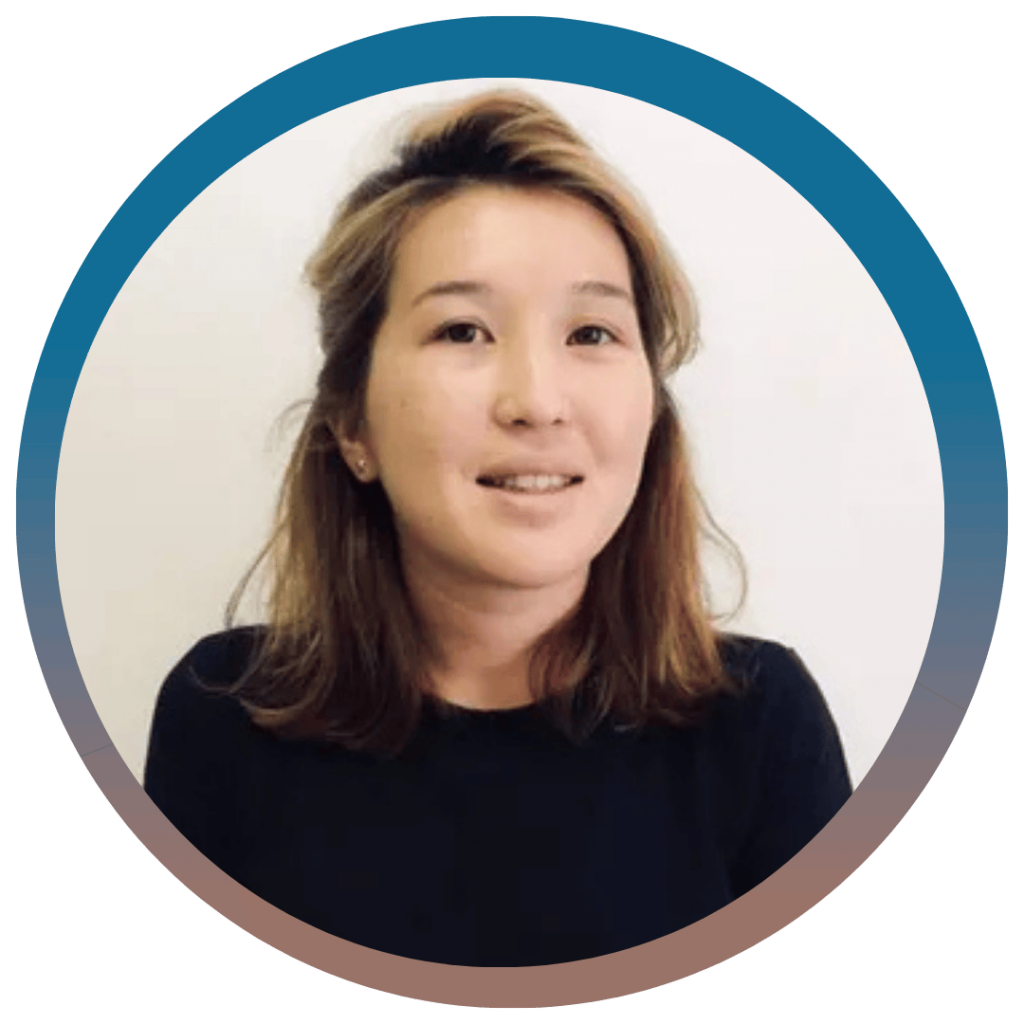
The Past and Present of Repression in Kyrgyzstan: The Legacy of Soviet Political Persecutions on the Path to Independent Kyrgyzstan
Aizhan Kadralieva (Kyrgyzstan)
researcher, activist, “Breaking the Silence” school alumni
Panel V. Digital Memory and Archives
10:30 – 12:00
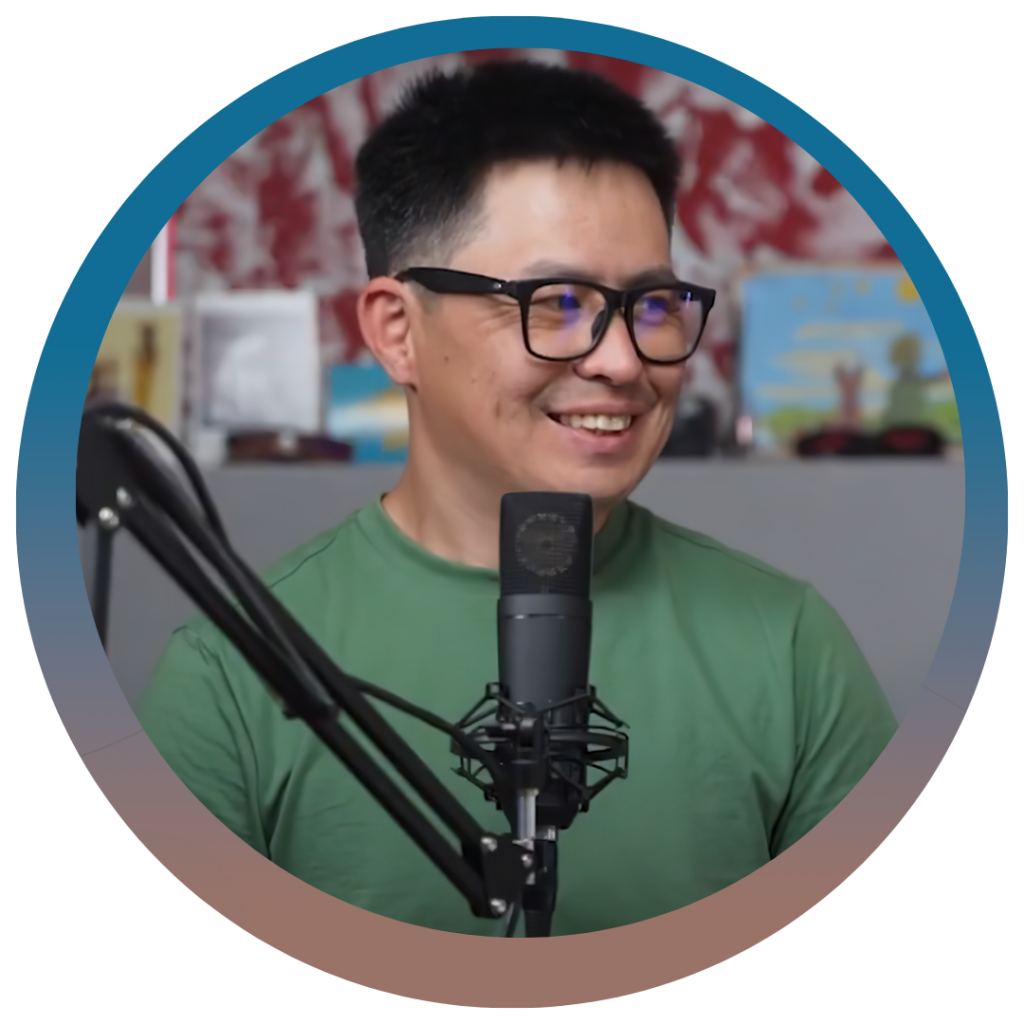
Moderator
Talgat Jumashev (Kyrgyzstan)
research fellow, “Living memory” Esimde school alumni
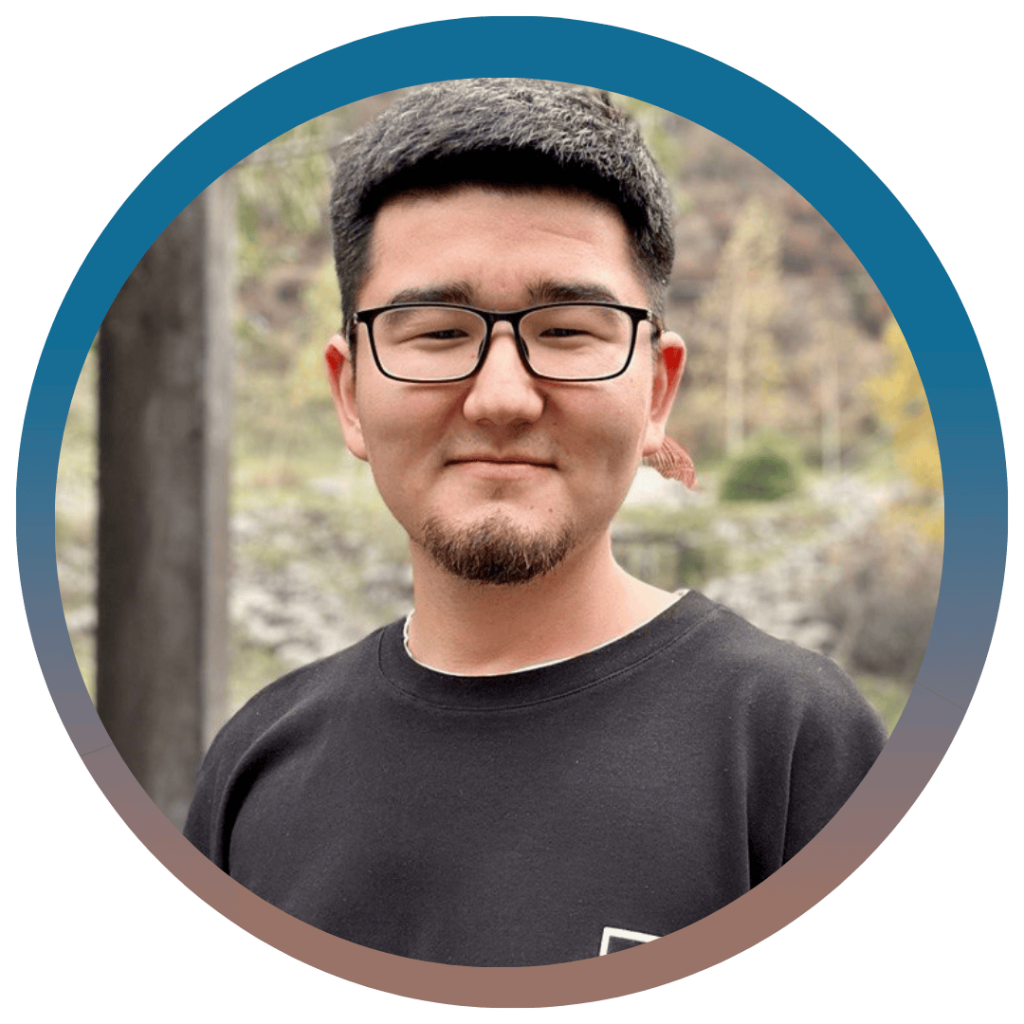
From Research to Databases: Discovering and Preserving Kyrgyzstan’s Silenced History
Avtandil Eshmambet (Kyrgyzstan)
Esimde Research and Discussion platform researcher
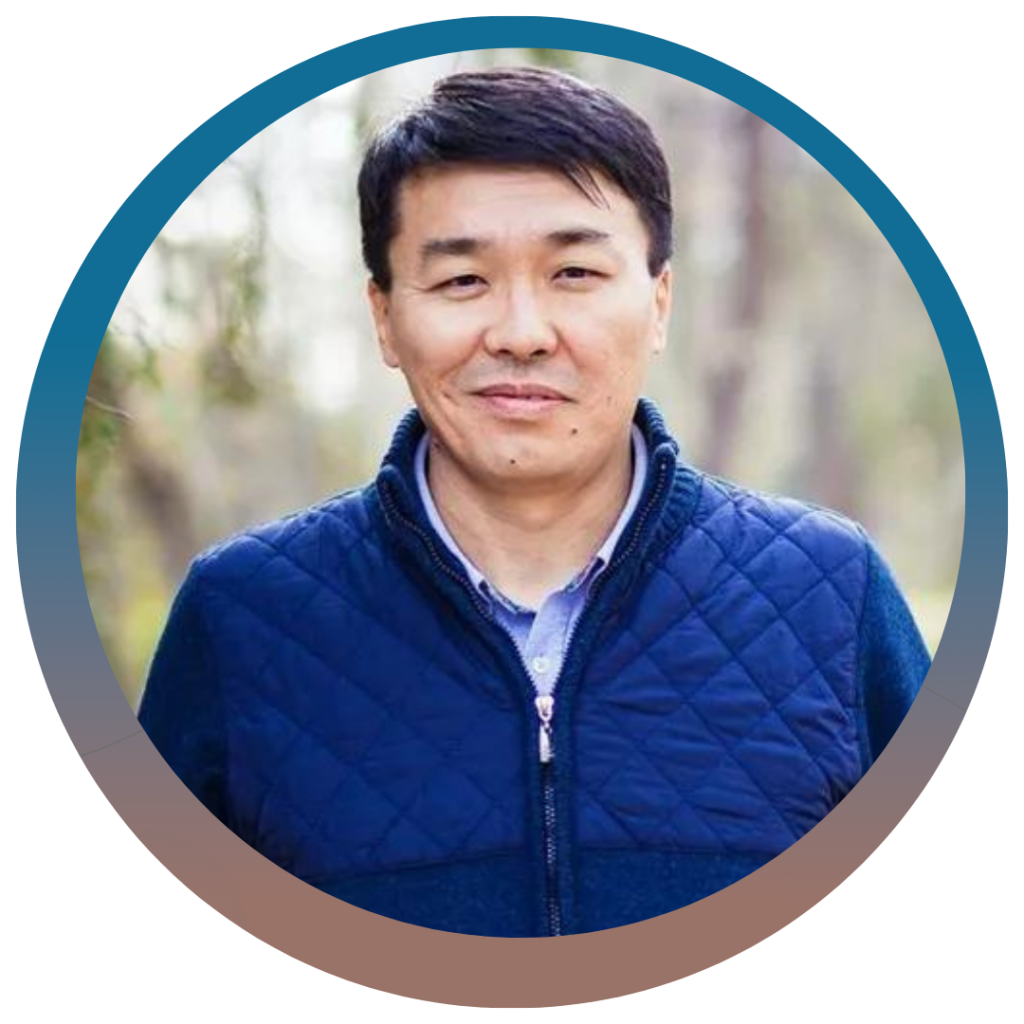
The Manuscript Collection «bizdin.kg»
Чоробек Сааданбек (Кыргызстан)
“Bizdin taryh” director, founder of “El-Sozduk”, “bizdin.kg” online platforms
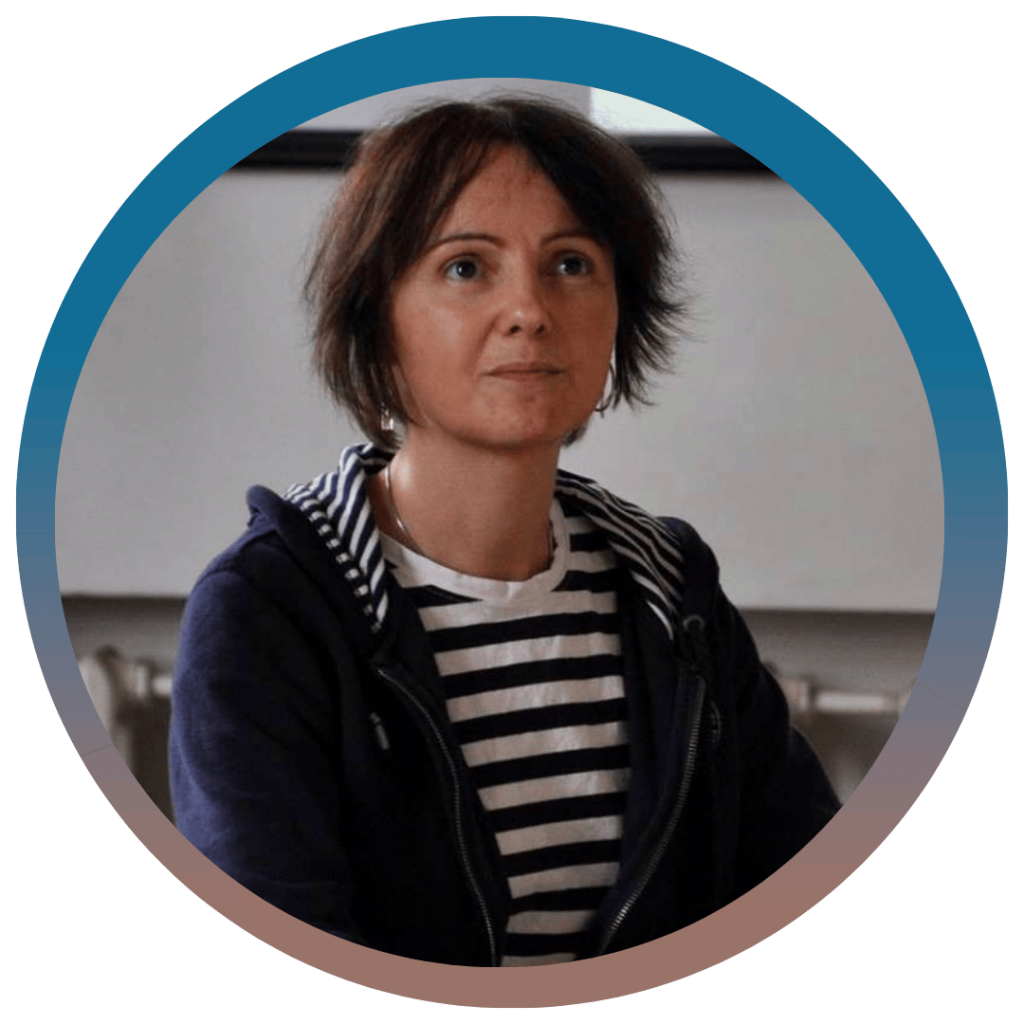
Memorial: Database of repressed
Alexandra Polivanova (Russia)
Cultural Programs Curator at the International human rights society “Memorial”
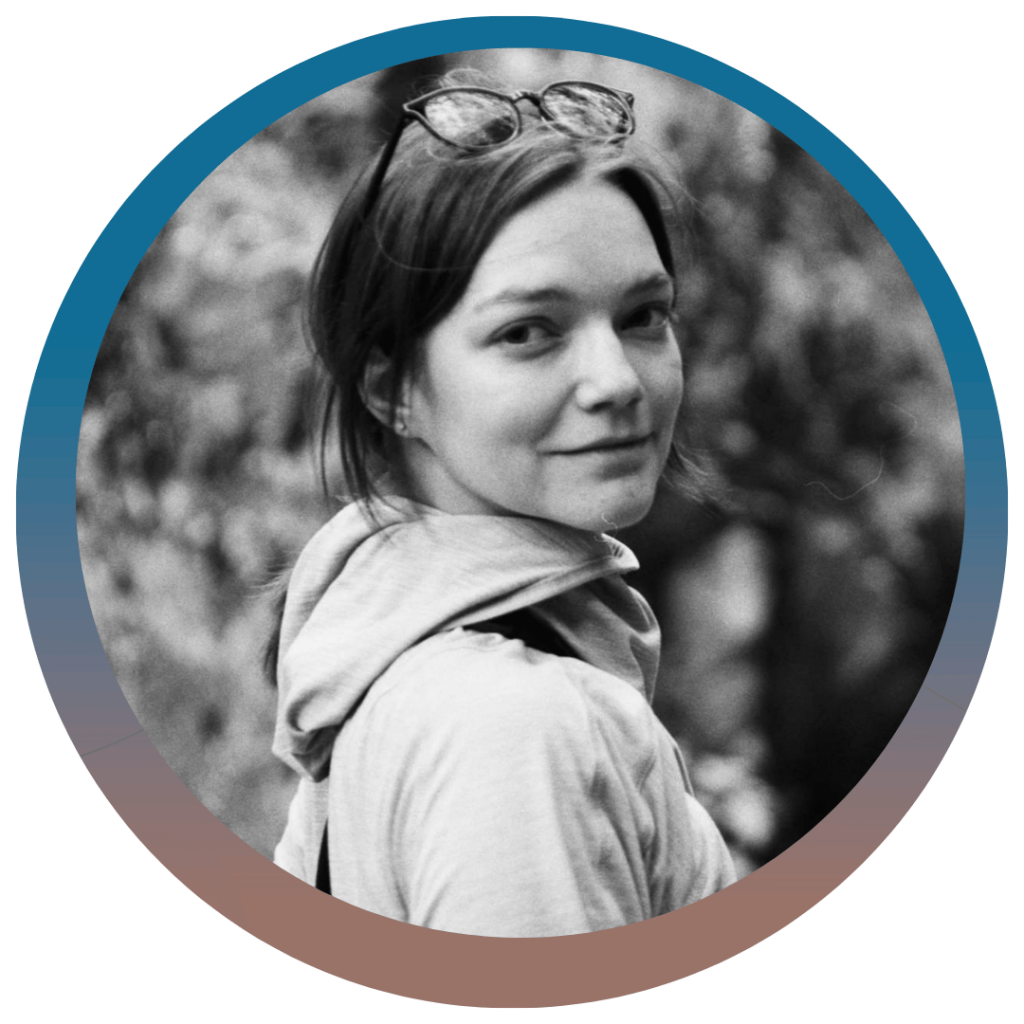
Tselinny Center of Contemporary Culture’s project “Documentation”
Tatiana Neuimina (Kazakhstan)
art historian, documentalist at Tselinny Center
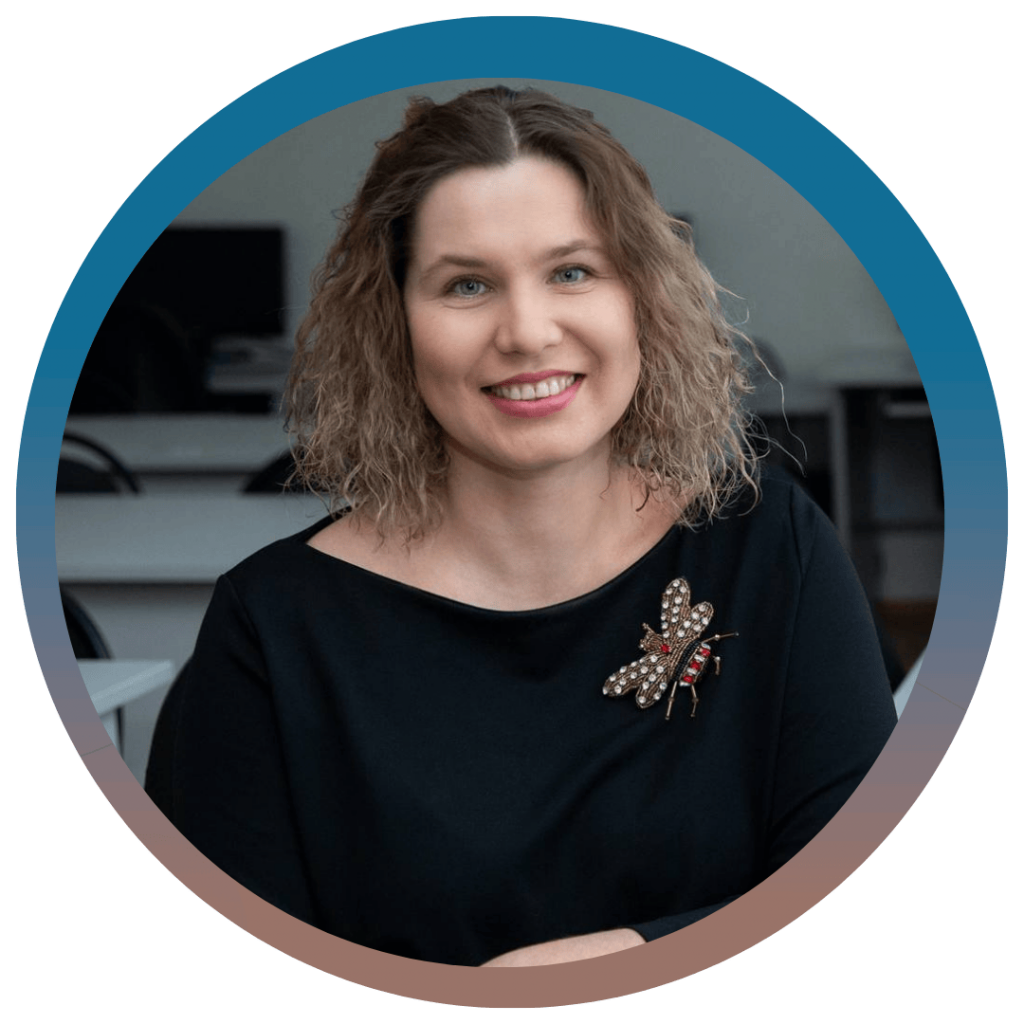
The Digital as a Tool of Colonisation and Decolonisation in the Context of Central Asia
Dinara Gagarina (Germany)
Researcher at the Department of History of Eastern Europe, University of Erlangen-Nuremberg, expert in digital humanities
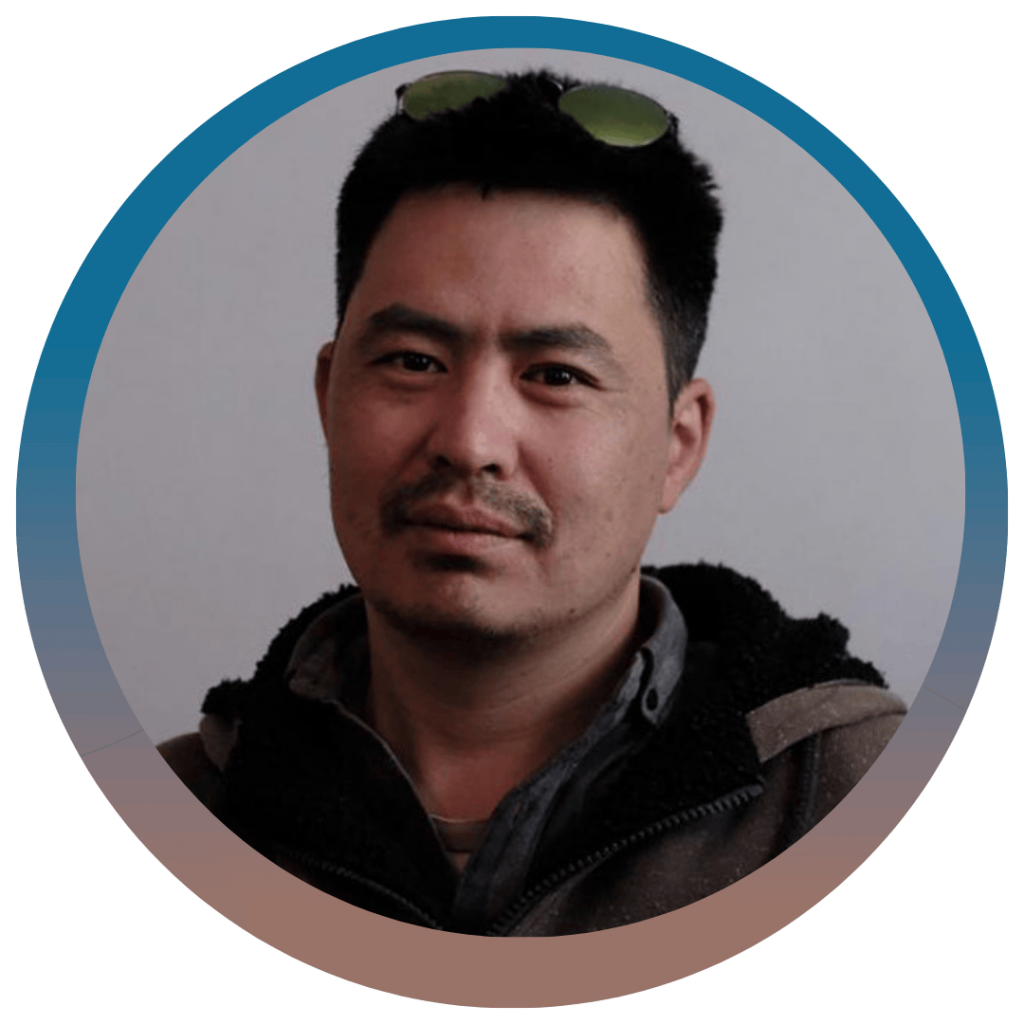
Technology and Origins: Opportunities and Challenges of Studying Memory in the Digital Age
Talgat Jumashev (Kyrgyzstan)
Researcher at the Laboratory for Social Innovation (SILK), PhD candidate in the Anthropology of Technology (Wageningen University & Research, Netherlands)
Tea and Snacks
12:00 – 13:00
#workshop. “Archives as a space for imagining the past and the future in the present”
I. Framing the archive as a space for alternative knowledge Dilda Ramazan, curator and art worker specialising in the contemporary art scene of Central Asian region
II. From theory to practice: attribution of digital materials Tatiana Neuimina, art historian, documentalist at Tselinny Center Emil Tilekov, designer and artist
13:00 – 14:30
Panel VI. Ecology and decolonization: re-thinking of the natural resources in the postcolonial states.
Part I. Legends and Myths of Central Asia: Ideas of Nature as a Mother
13:00 – 14:00

Moderator
Elmira Abylbek
head of Esimde Research and Discussion Platform
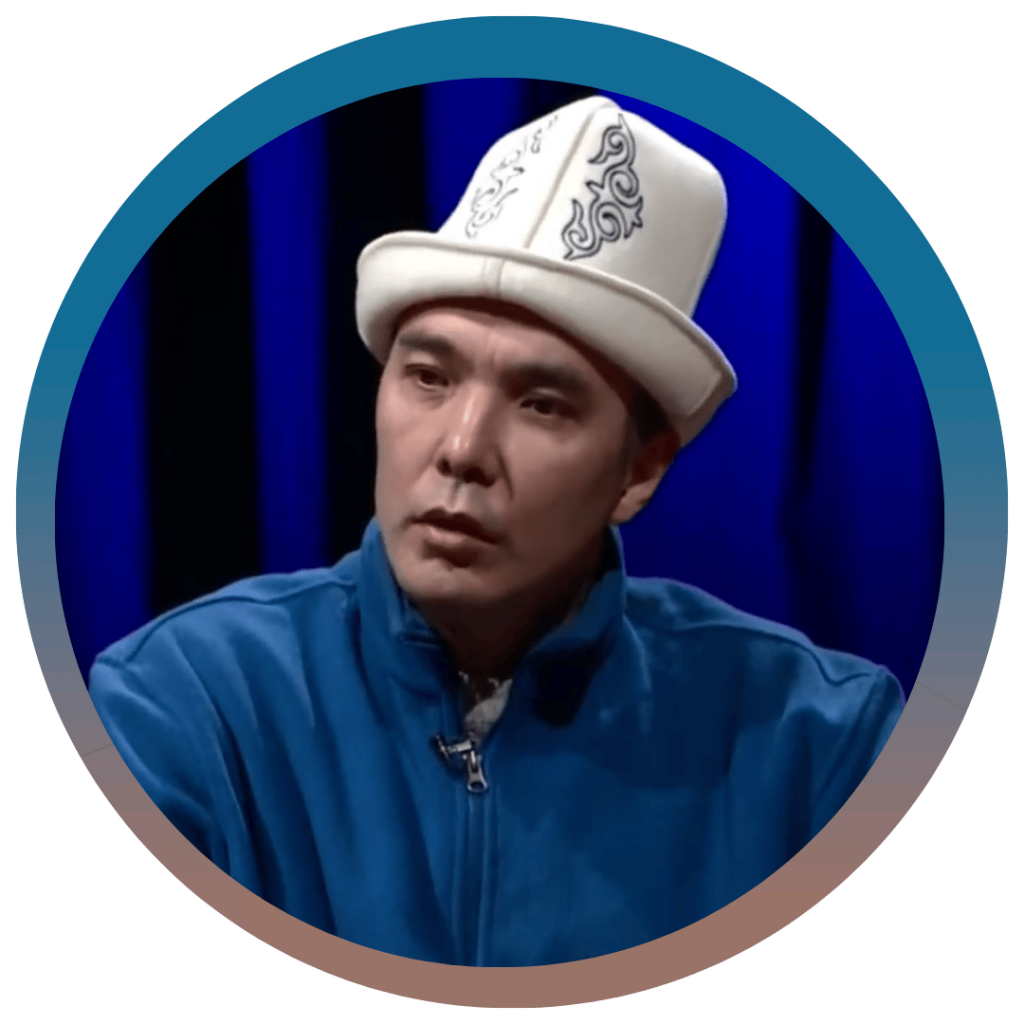
Nature as Emptiness
Eleri Bitikci (Kyrgyzstan)
researcher of Kyrgyz history, public figure, expert in ancient Kyrgyz culture and literacy – Bitig
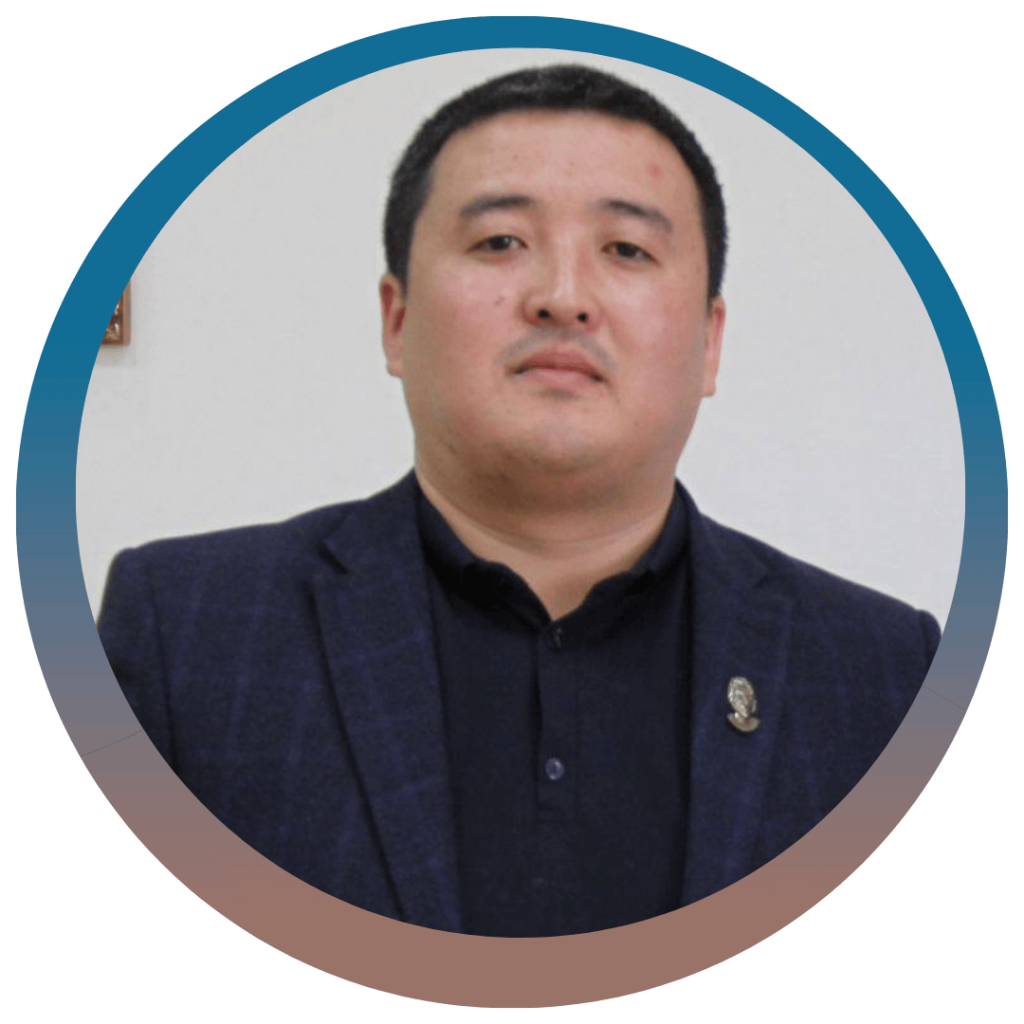
The Theme of Nature in Kyrgyz Legends: A New Perspective on Asan Kaigy
Nursultan Abdimitalip (Kyrgyzstan)
philosopher and Historian.
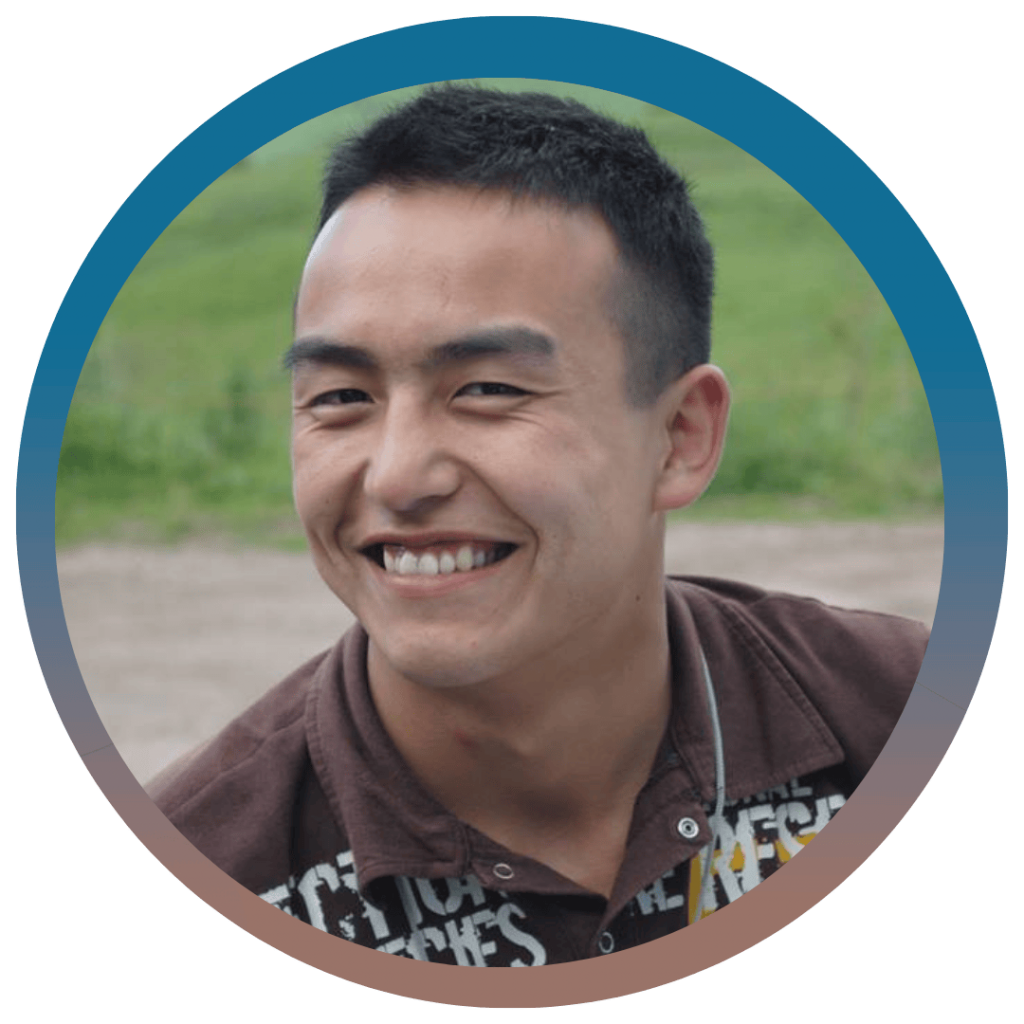
Community-protected areas: decolonising models of conservation?
Aybek Samakov (Kyrgyzstan)
anthropologist, researcher
Panel VI. Ecology and decolonization: re-thinking of the natural resources in the postcolonial states.
Part II. Natural Resource Management and the Eco-Agenda after the Reforms of the 1990s
14:00 – 15:40
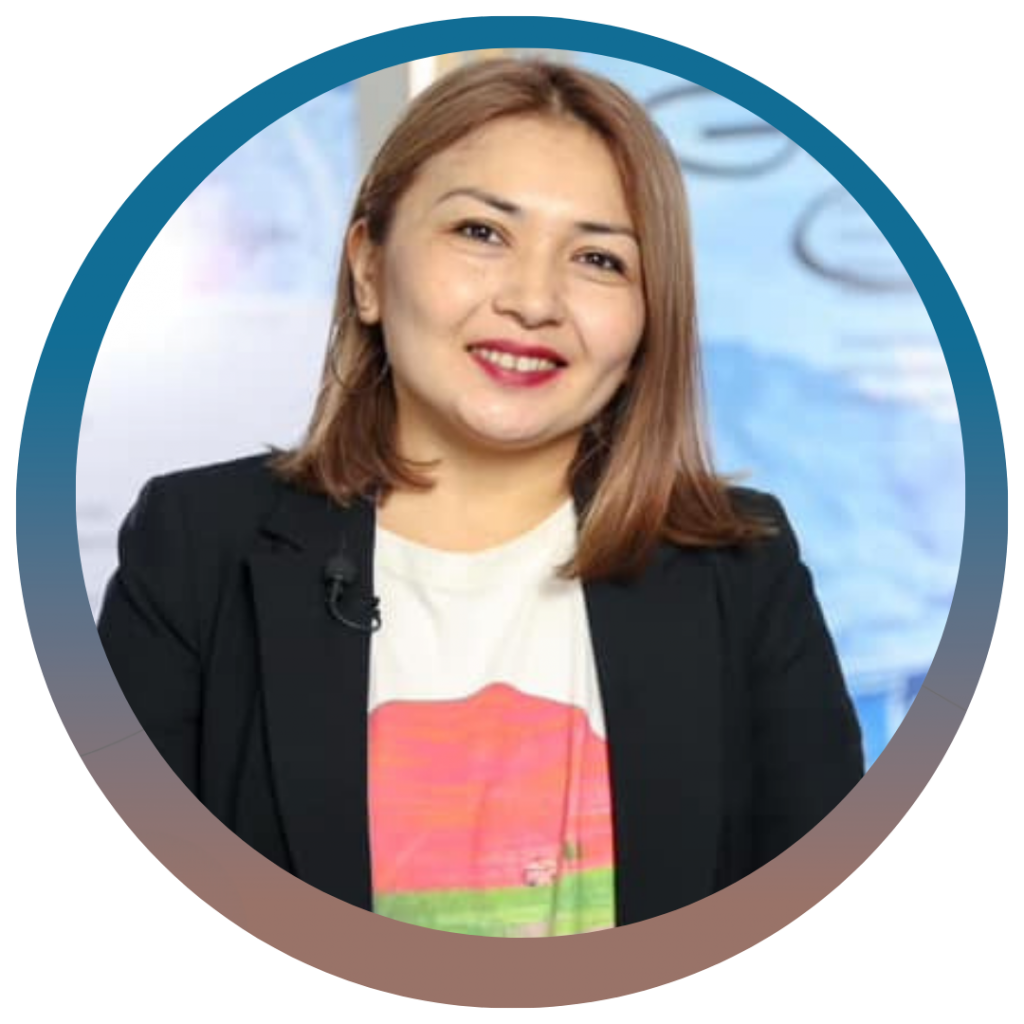
Moderator
Asel Murzakulova (Kyrgyzstan)
PhD in Political Sciences, Senior Researcher at the Institute of Mountain Communities Research, University of Central Asia
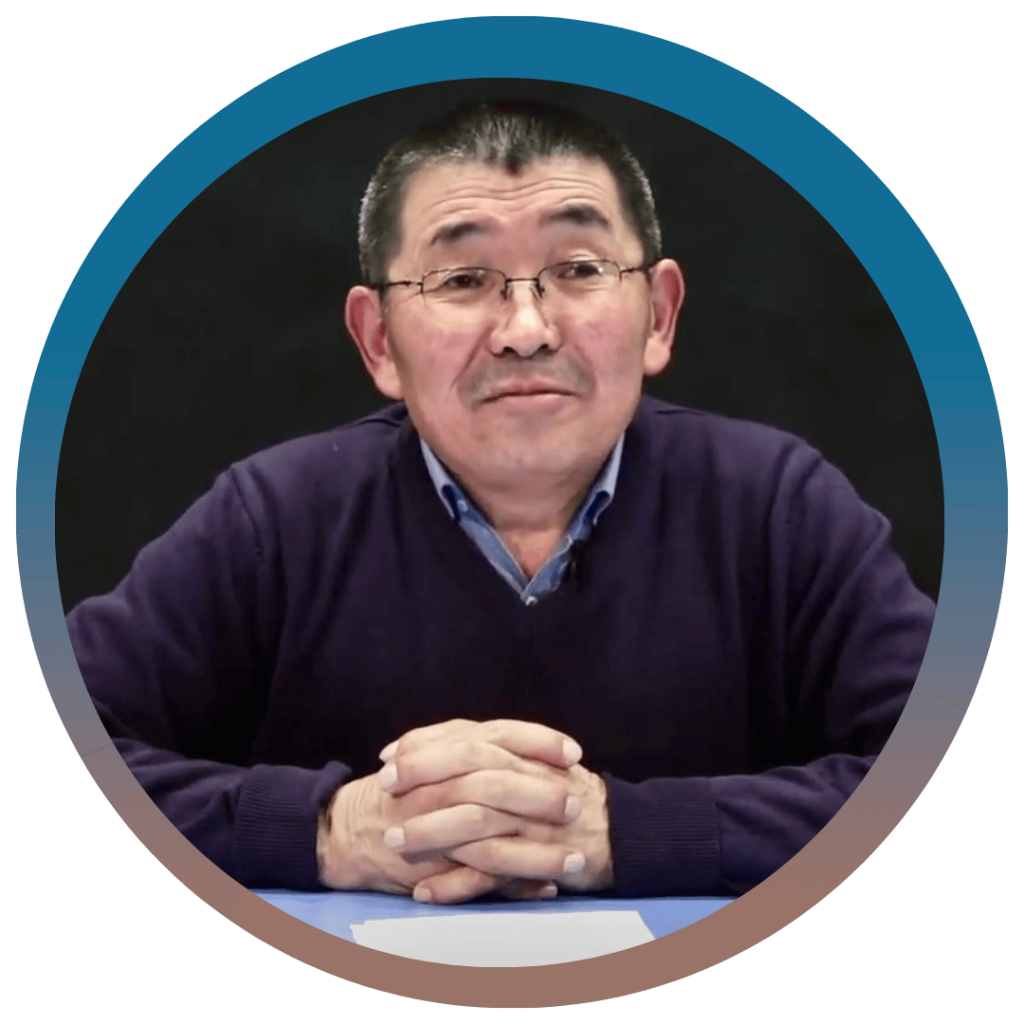
Utilisation of seasonal pastures in Kyrgyzstan and environmental problems
Amantur Zhaparov (Kyrgyzstan)
historian, ethnographer, candidate of historical sciences, leading researcher of the National Academy of Sciences of the KR
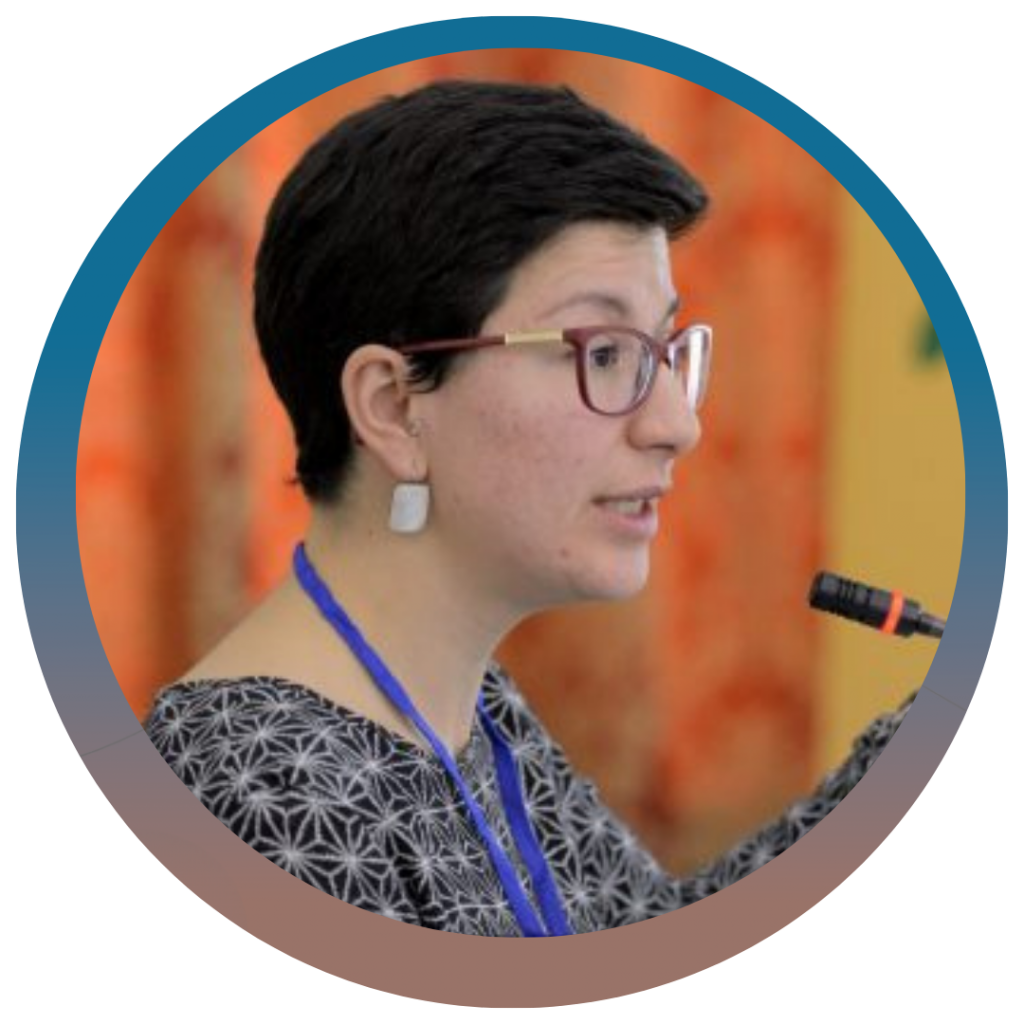
Reflections on Values and the Emergence of a Decolonial Perspective in Pasture Management
Irene Mestre
Researcher at the French Institute for Central Asian Studies (IFEAC)

TBA
Bermet Borubaeva (Kyrgyzstan)
independent researcher, activist
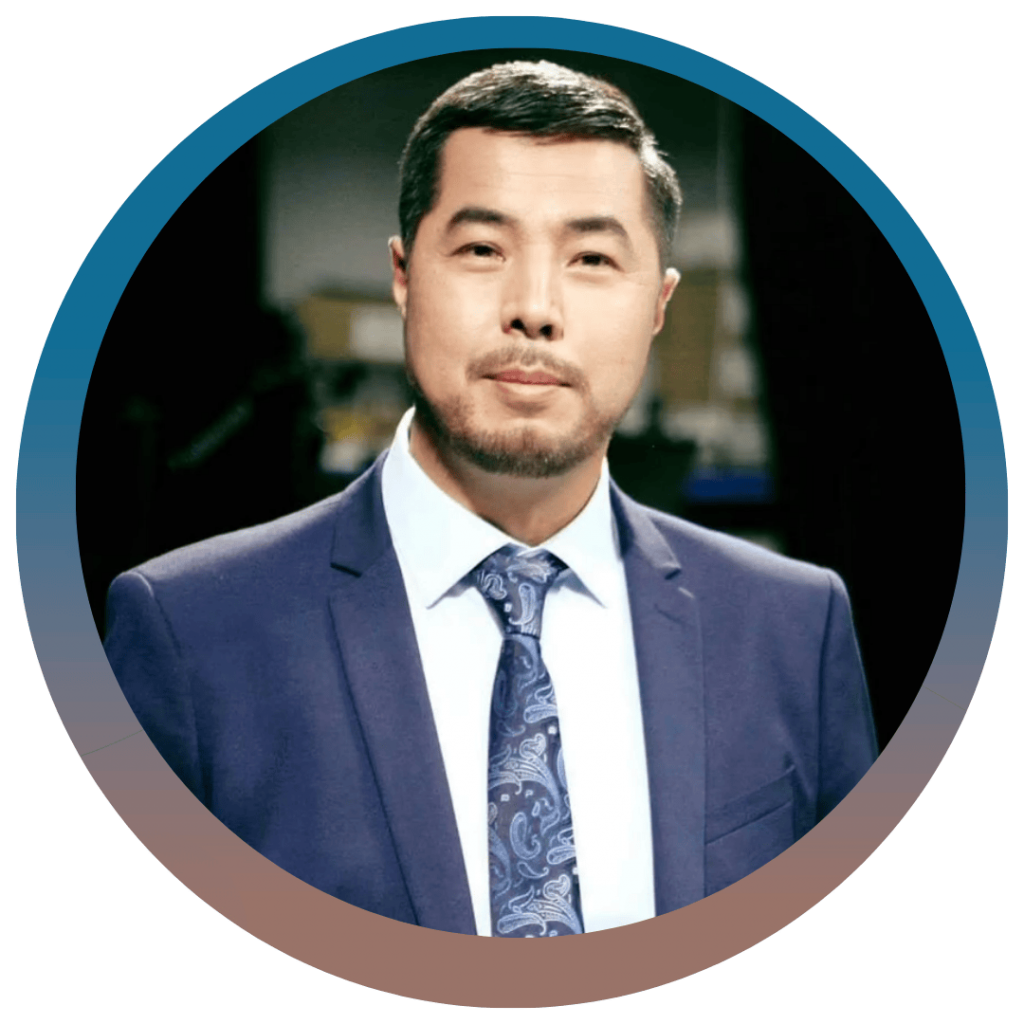
TBA
Sabyr Abdymomunov (Kyrgyzstan)
journalist, activist
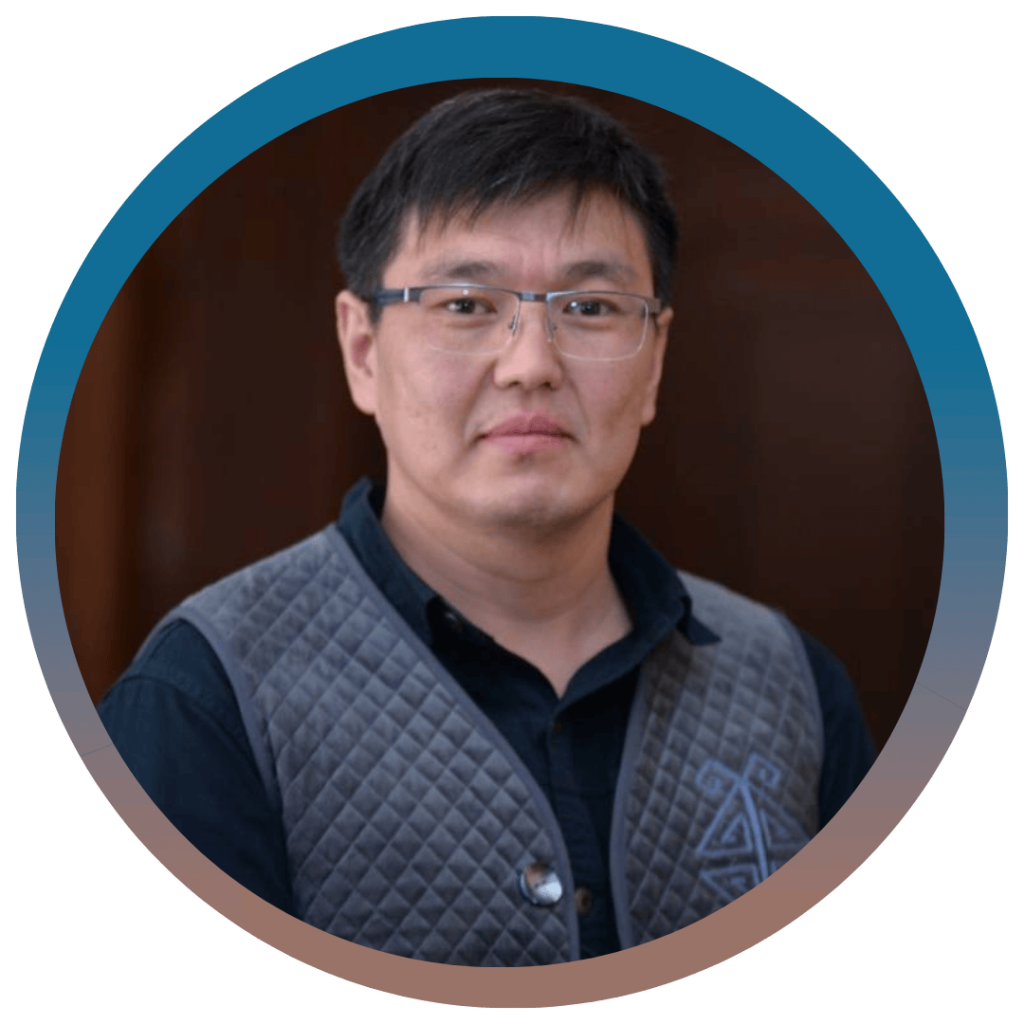
The Development of Agricultural Systems in Kyrgyzstan after the Reforms of 1991
Azamat Azarov (Kyrgyzstan)
research fellow at the Institute of Mountain Community Studies
Panel VII. Language as a Tool of Memory and Decolonization
16:00 – 17:00
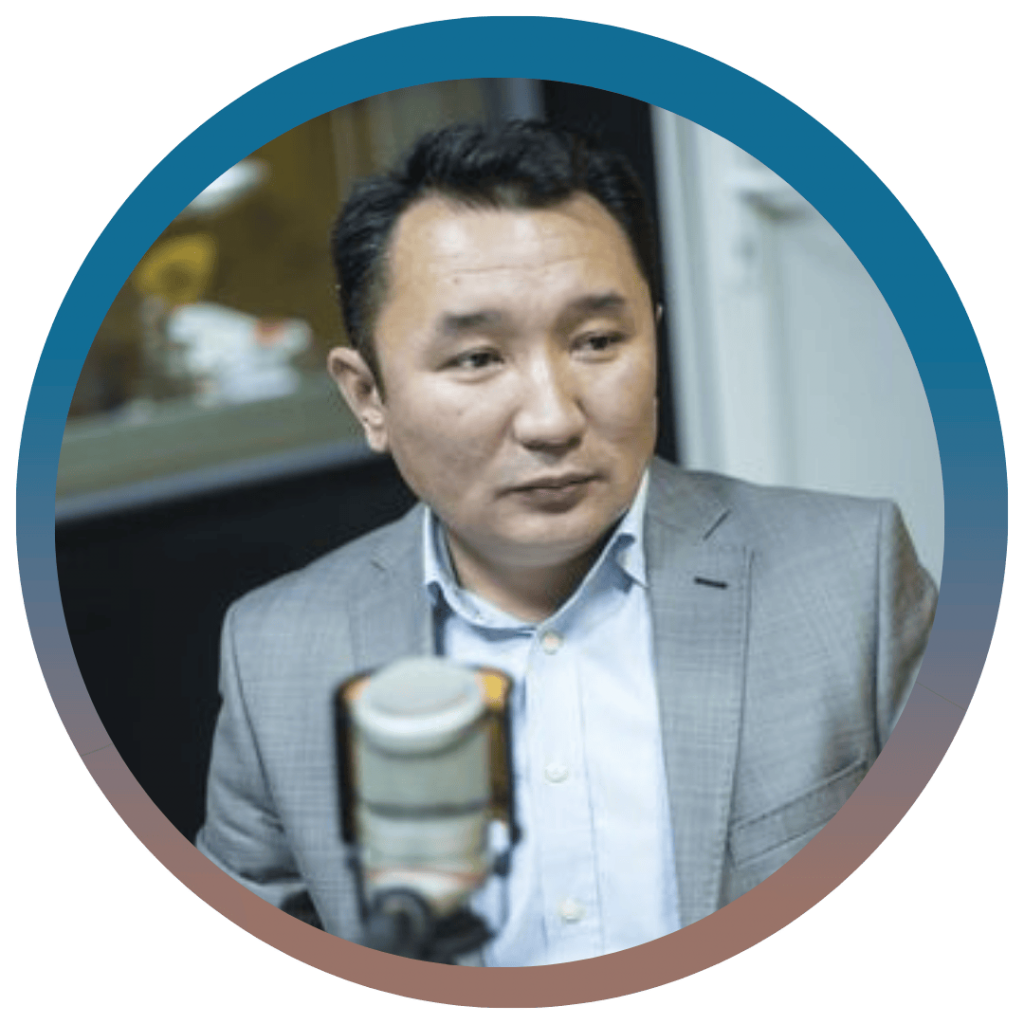
Moderator
Mirzhan Balybaev (Kyrgyzstan)
media expert
Esimde Research Presentation:
“On the Problems and Opportunities for Developing the Kyrgyz Language Ecosystem in Media”

Semantic Changes in the Kyrgyz Language
Eleri Bitikci (Kyrgyzstan)
historian and philosopher.

Changes in the Kyrgyz Language Ecosystem: A Linguistic Analysis (I)
Mukaram Toktogulova (Kyrgyzstan)
PhD in Philology, associate professor at the AUCA
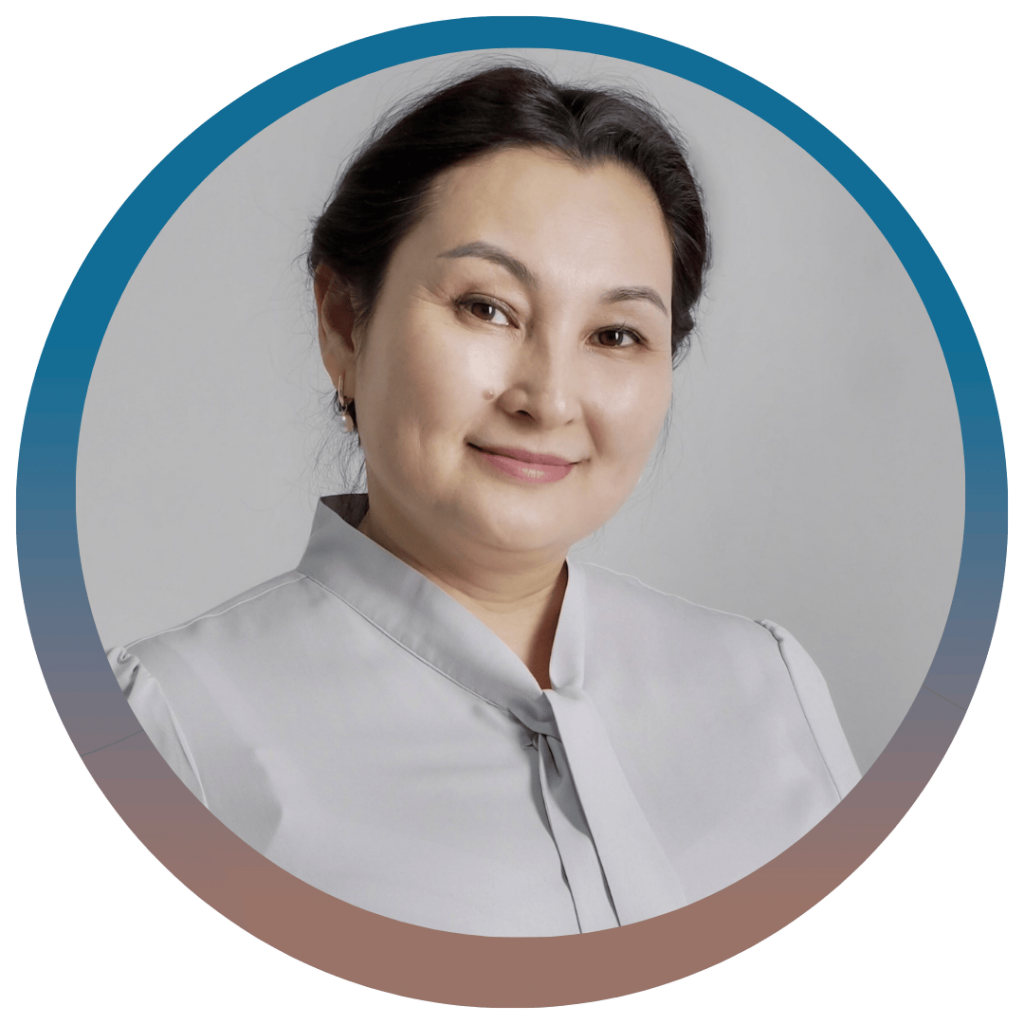
Кыргыз тилинин экоChanges in the Kyrgyz Language Ecosystem: A Linguistic Analysis (II)
Gulzada Stanalieva (Kyrgyzstan)
PhD in Philology, professor at the Manas Kyrgyz-Turkish University
***
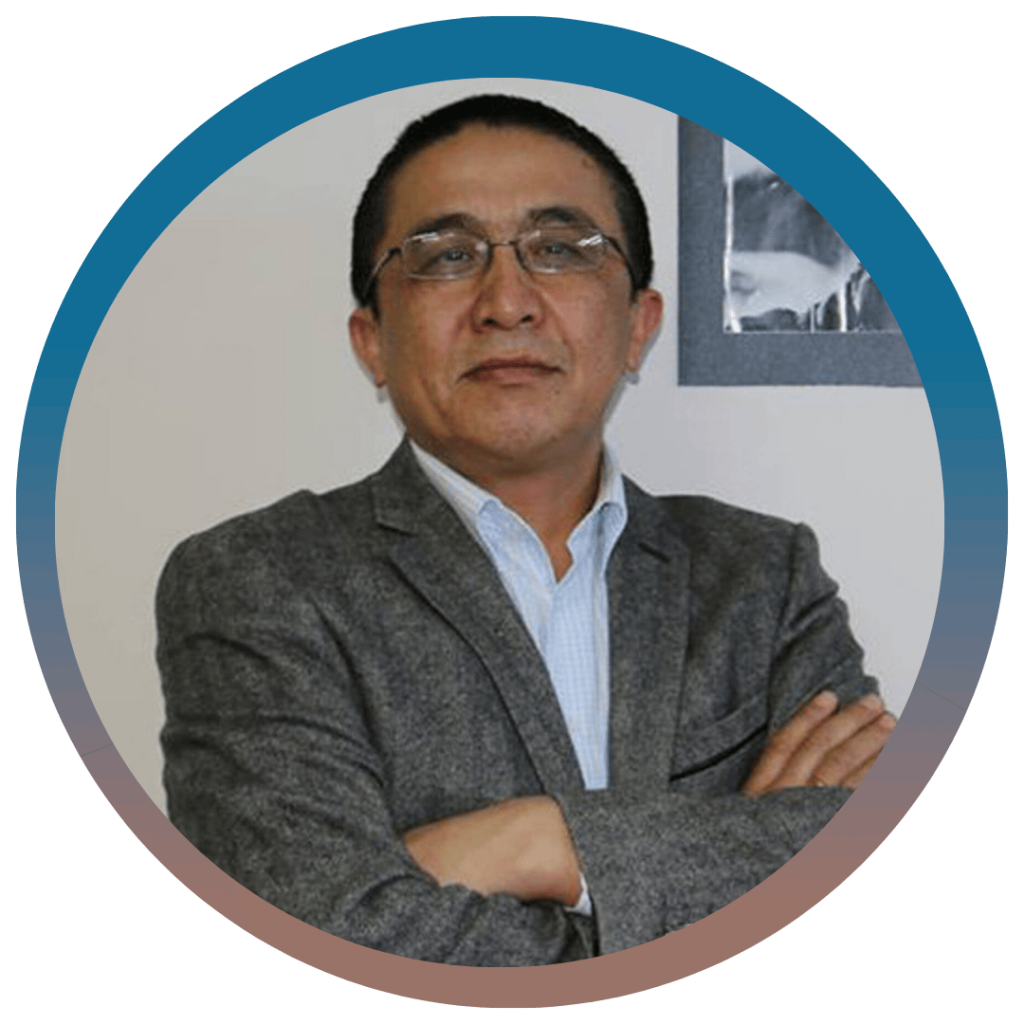
TBA
Bakyt Orunbekov (Kyrgyzstan)
journalist, senior lecturer at Manas Kyrgyz-Turkish University
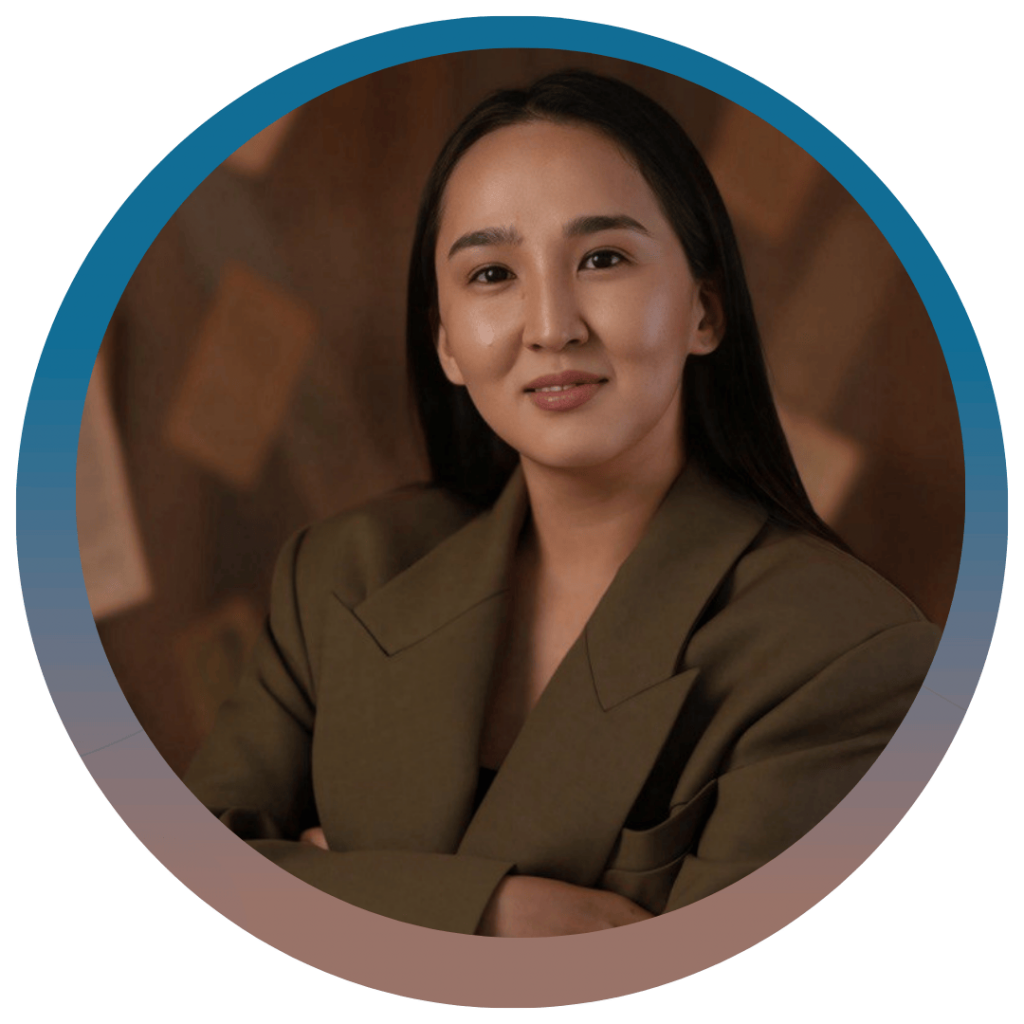
The film “Orystandyru”
Aliya Ashim (Kazakhstan)
journalist, director and documentary filmmaker.
Film Screening:
Aliya Ashim film “Orystandyru” (Russification)
17:30 – 18:30
DAY III
October 19th
Registration
9:00 – 9:30
Panel VIII. Memory Museums
9:30 – 11:00
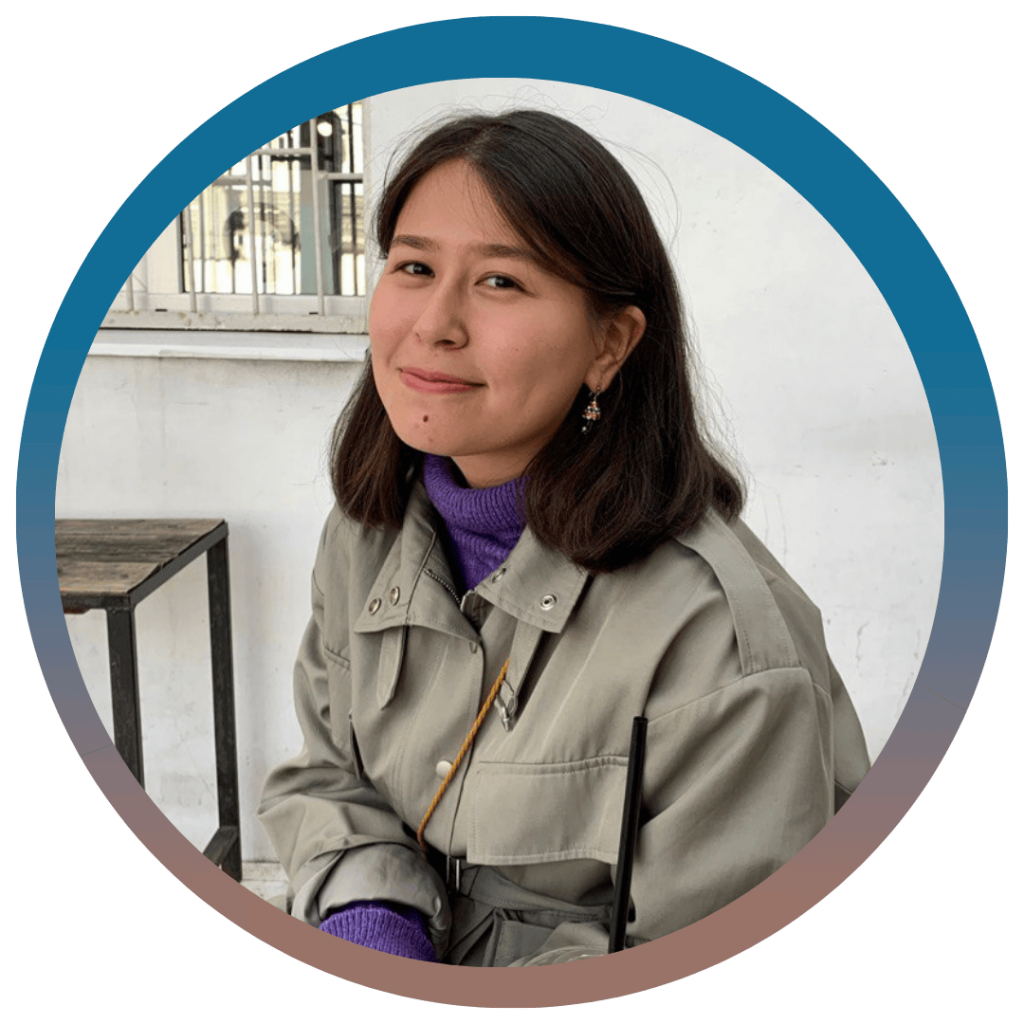
Imagination as a research tool for the Urkun museum
Asel Rashidova (Kyrgyzstan)
museum worker and researcher
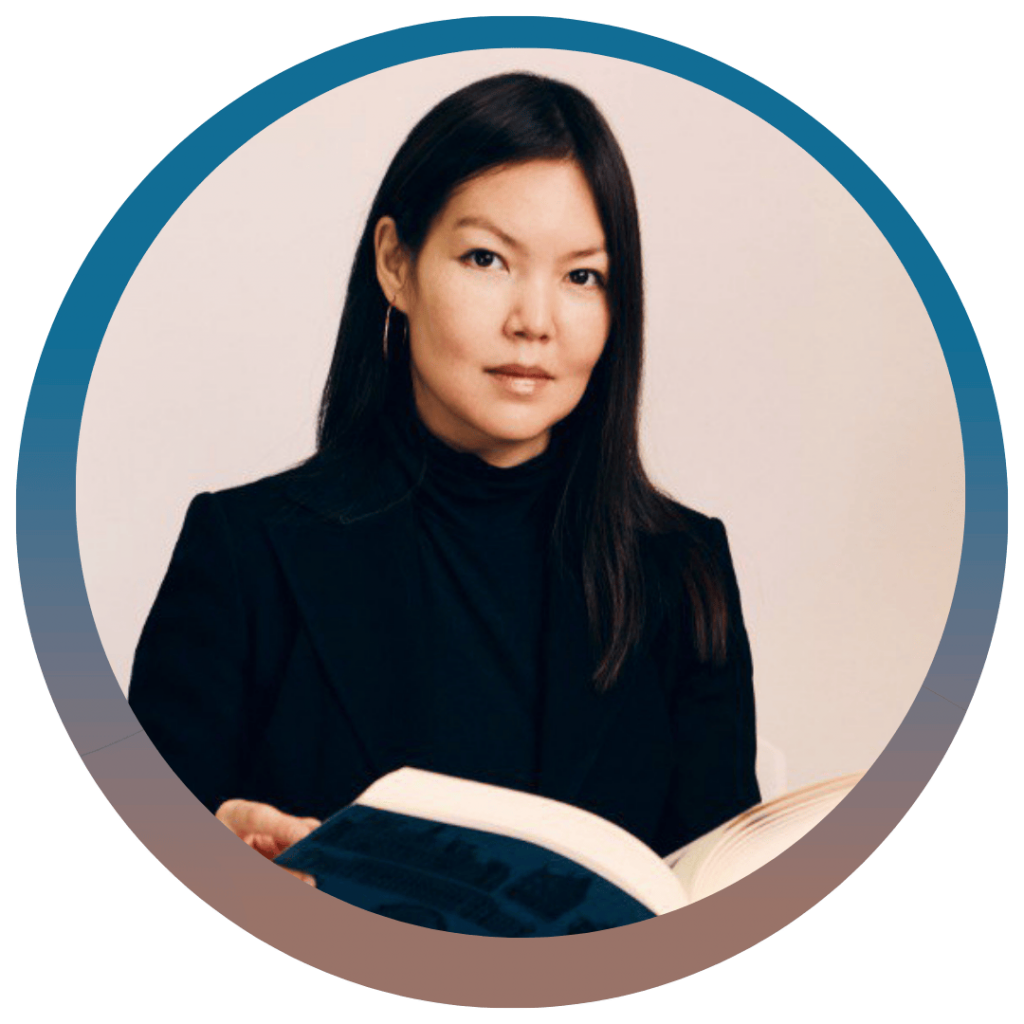
[Not] a Museum of Architecture: Participatory Practices of Engaging with History and the Memory of a Place through the Lens of Architecture and Art
Anel Moldakhmetova (Kazakhstan)
co-founder of Archcode Almaty and [non-]Museum of Architecture

From occupations to freedom: the story of Vabamu
Martin Vaino (Estonia)
head of exhibitions, Vabamu Museum of Occupations and Freedom
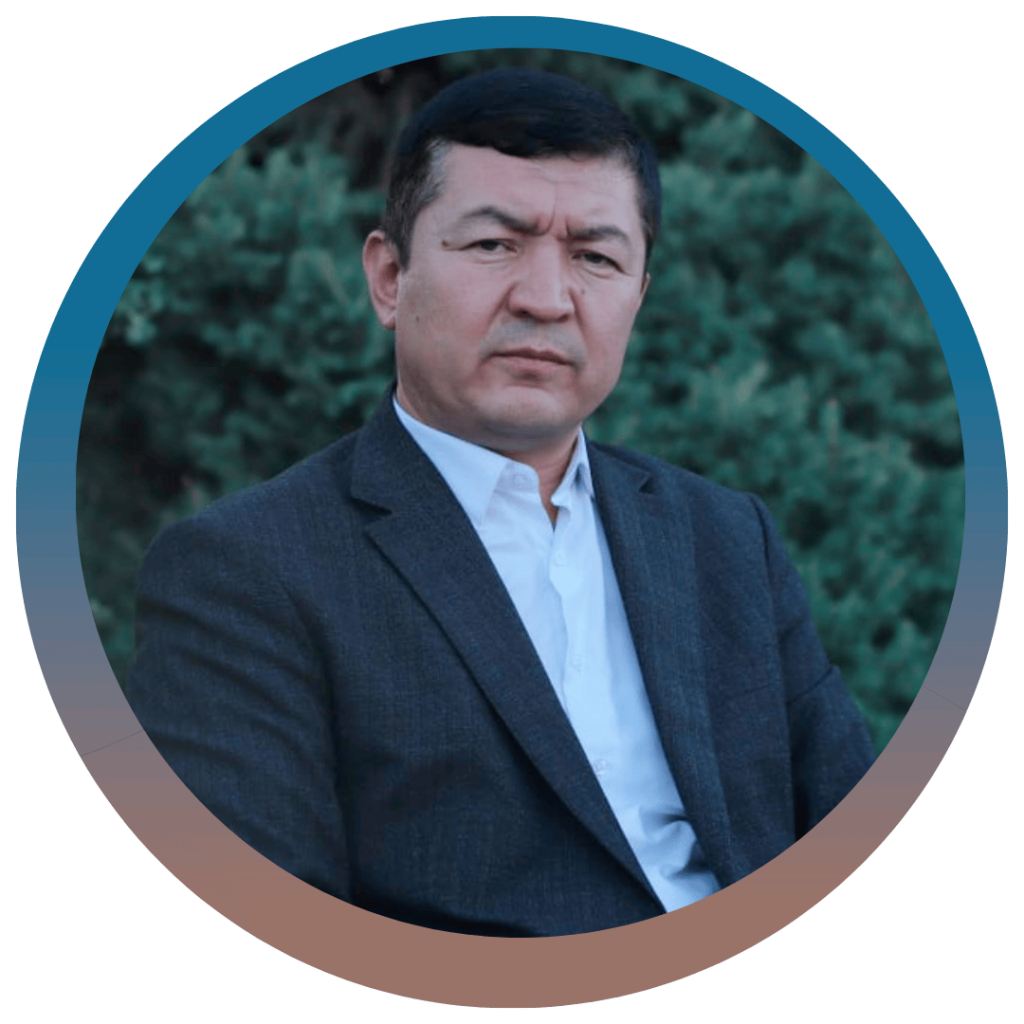
The Reflection of the “Jizzakh Uprising” and the “Cotton Case” in the Museum of Victims of Political Repression
Bakhrom Irzaev (Uzbekistan)
Chief Researcher, Museum of Victims of Political Repressions
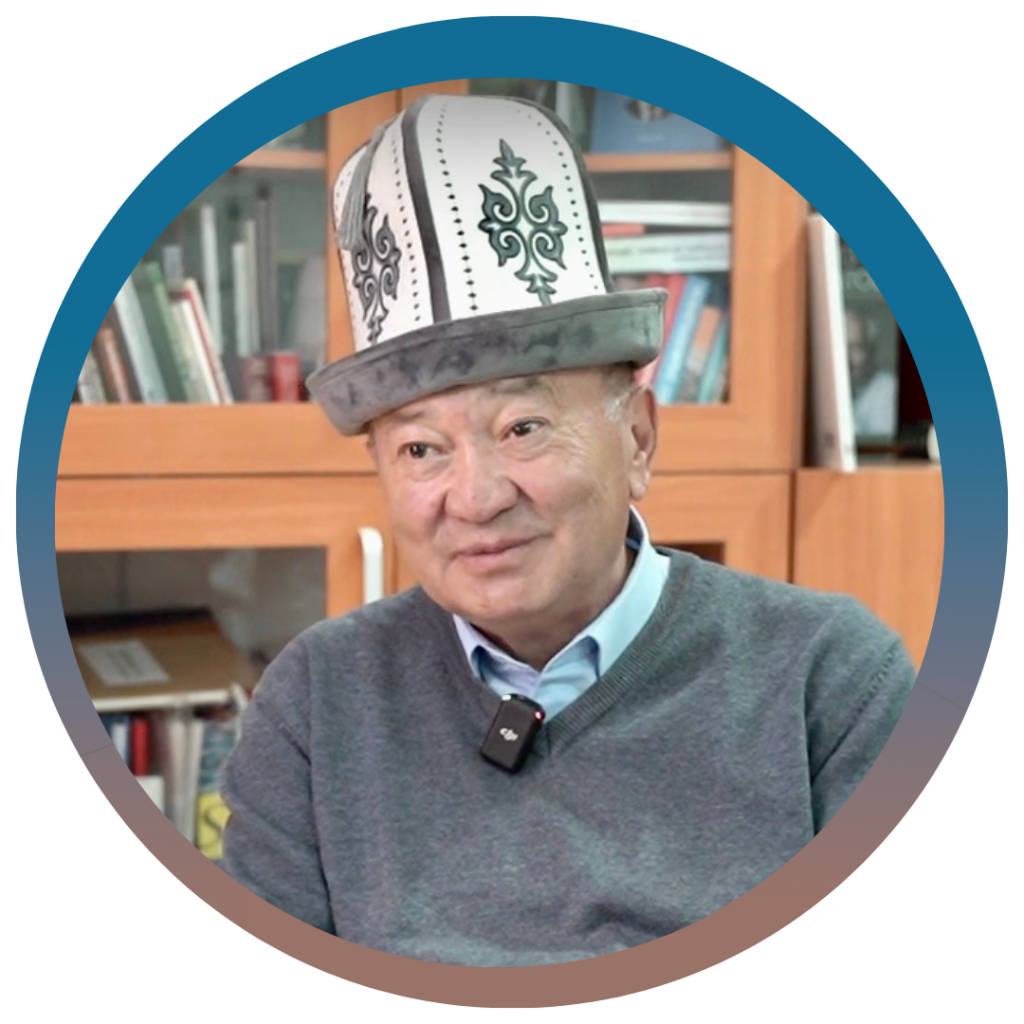
Ata-Beiyt is a sacred place
Bolot Abdrakhmanov (Kyrgyzstan)
Director, Ata-Beyit Memorial Complex
Panel IX. From Image to Meaning: Reflections Around the Exhibition “Caravan on the routes of memory”
11:00 – 12:30

Moderator
Elmira Abylbek
head of Esimde research and discussion platform.

“Belgisiz kelin” art project
Saule Suleimenova (Kazakhstan)
artist working in a variety of mediums from paintings and graphics to public art

Zhyrtyshtar. Memory about a person
Bolot Isabekov (Kyrgyzstan)
a photographer

Questions of representation in a conversation about the exhibition “Caravan along the roads of memory”
Maksud Askarov (Uzbekistan)
researcher, curator

Cutting Holes in the Koshma: Colonial Heritage in Art Decolonial Practices of Central Asia
Alexey Ulko (Uzbekistan)
researcher, film director

Aivanizm in Life and Art
Gamal Bokonbaev (Кыргызстан)
informal cultural critic, director of Tolon Museum of Modern Art
#workshop. On Applied Art and Memory by Saule Suleimenova, artist working in a variety of mediums from paintings and graphics to public art
12:30 – 13:30
Tea and Snacks
13:30 – 14:30
Excursion to the Tolon Museum of Modern Art in Kuntuu village with Gamal Bokonbaev
14:30 – 17:00
Layout of the program on the site: Avtandil Eshmambet
